Business
Taking the Leap into Entrepreneurship With Tony Hill
Published
2 years agoon
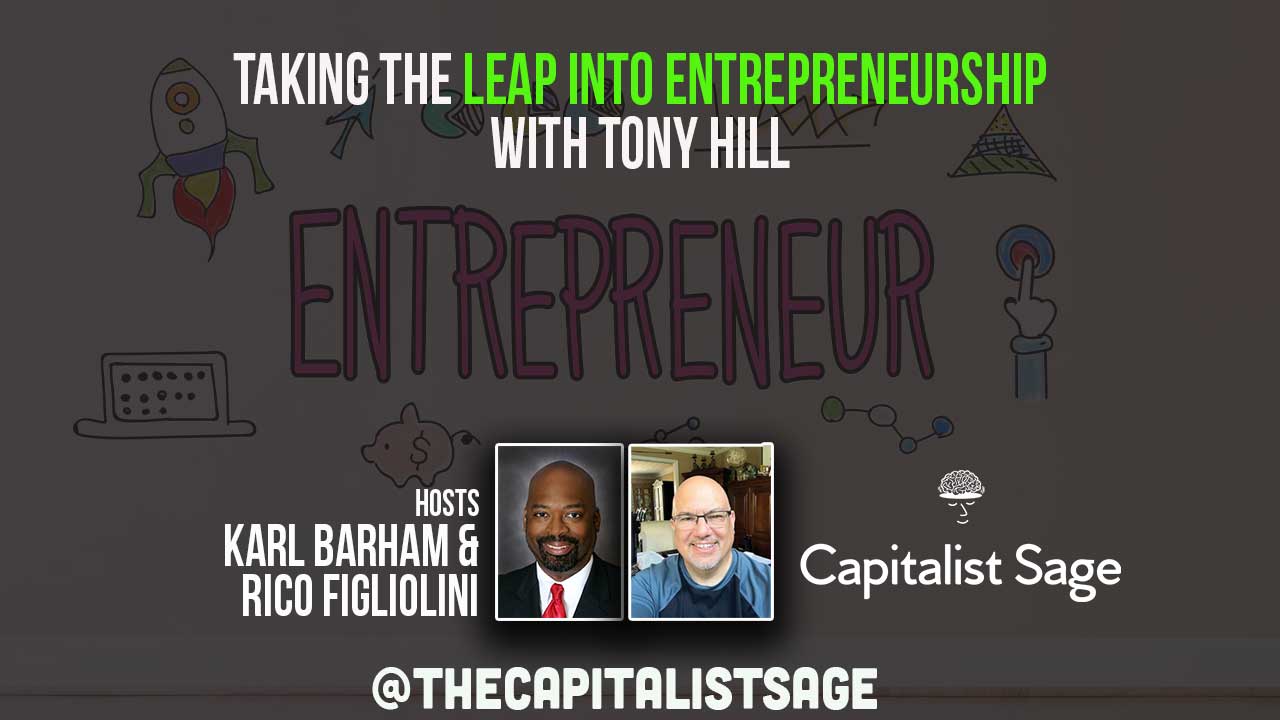
What does it take to be an entrepreneur? Tony Hill, Founder and Chairman of Preschool Solutions Inc. who, with his wife, have developed, own, and operate Goddard School Franchises in metro Atlanta talks about taking that huge leap into entrepreneurship and what it takes. Listen in as Hill and hosts Karl Barham and Rico Figliolini discuss getting into a business as well as the importance of wellness for you, your family, and your community. Hill shares interesting insights on planning before starting a business.
Resources:
Young Presidents Organization: https://www.ypo.org
Entrepreneurs’ Organization: https://hub.eonetwork.org
Vistage: https://www.vistage.com
Georgia Chamber of Commerce: https://www.gachamber.com
“Entrepreneurship is not a job, it’s a lifestyle. And I think it’s very important to assess what type of lifestyle you want for your family and how entrepreneurship will work or integrate into what you see as the type of lifestyle you want… You have to choose a space that allows you to blend those two.”
TONY HILL
Timestamp:
[00:00:30] – Intro
[00:01:52] – About Tony
[00:03:37] – Considering Entrepreneurship
[00:05:35] – The Importance of Wellness
[00:10:52] – Purpose and Mission
[00:17:33] – Being Financially Prepared
[00:27:40] – Building Your Team
[00:32:20] – Taking the Leap
[00:37:06] – Closing
Podcast Transcript:
[00:00:30] Karl: Welcome to the Capitalist Sage Podcast. We’re here to bring you advice and tips from seasoned pros and experts to help you improve your business. I’m Karl Barham with Transworld Business Advisors of Atlanta Peachtree, and my co-host is Rico Figliolini with Mighty Rockets, Digital Marketing and the publisher of the Peachtree Corner Magazine. Rico, how are you doing today?
[00:00:49] Rico: Hey Karl. Good, excellent. Beautiful day outside. Nice and warm. Just the way I like it.
[00:00:54] Karl: Excellent. Why don’t you introduce our sponsor for today’s podcast?
[00:00:57] Rico: Sure. The sponsor of these family podcasts, this including Peachtree Corners Life and Prime Lunchtime with the City Manager, is brought to you by Peachtree Corners Magazine. And the latest issue is actually out now. Let me show you a copy of it. There you go. So the best of Peachtree Corners, there’s over 30 categories. Plus a lot of other articles in here that you should be picking up and looking at. It should be hitting mailboxes today. Otherwise go to the nearest restaurant or other store within Peachtree Corners in the next few days, and you’ll find copies there. Or actually go online at LivingInPeachtreeCorners.com and look at the digital edition that’s there.
[00:01:35] Karl: I saw my copy come in on the kitchen table this morning, so they’re definitely getting out there. Another great magazine. I love all the different businesses and restaurants and stuff that were highlighted. There were some that I never saw before and definitely going to check out. Great addition.
[00:01:51] Rico: Excellent. Thank you, Carl.
[00:01:52] Karl: Today’s guest is Tony Hill. He’s an investor, with Solutions Force. And we’re here to talk about taking the leap into entrepreneurship. The top things that anybody should consider when they’re ready to make that leap. Hey Tony, how are you doing today?
[00:02:11] Tony: I’m doing fantastic Karl. How are you?
[00:02:13] Karl: Oh, we’re doing well. As we get started, why don’t we just do a quick introduction to yourself? Tell folks a little about you.
[00:02:20] Tony: Sure, sure. So I am a native of upstate New York. Been in Atlanta now about twenty-five years via way of Maryland. Where I went to school at Morgan State and I gained a industrial engineering degree. Took a transfer down here, corporate America in ’96 and pretty much transplanted ever since. And my wife and I have two pretty much college-aged kids. One in college, one on his way in six months. And we have owned some smaller family businesses for a while that she runs. That’s what brings me here today.
[00:02:54] Karl: Excellent. Taking this leap into entrepreneurship, I know we’ve been having conversations with a lot of people that have worked for various companies for other folks. And now after these, going into year two of the pandemic, folks are changing their priorities and thinking about taking a leap. And when we’re having those conversations, there’s a bunch of stuff that they’re considering, and there’s a bunch of stuff that they probably haven’t thought about as they’re going through that journey. So I wanted to chat a little bit about that today and start off with, what are some of the things, when you were making that shift that you considered was helping you with the decision for you and your family to go down a more entrepreneurial path?
[00:03:37] Tony: Sure. So we’ve been married about 22 years and early on in our marriage, we both had entrepreneur interests. And so we started off earlier in our marriage. So a couple things we did and we’ve been, like I said, small business owners for some time now, 15 plus years. But one, we wanted to find a business that would work for our family and the things that were important for our family. So I think understanding that entrepreneurship is not a job, it’s a lifestyle. And I think it’s very important to assess what type of lifestyle you want for your family and if, and how entrepreneurship will work or integrate into what you see as what you want, the type of lifestyle you want. So I think that’s first and foremost. And I think you have to choose a space that allows you to blend those two. And I guess at some point there is, for me, it’s really important when people think about this entrepreneurship is not a job it’s a lifestyle.
[00:04:43] Karl: I love that you highlighted that point. Very often when someone comes into our office and they’re talking about acquiring a business or starting a franchise or starting a business of any type, they start with numbers. They say, I need to make this much money from the business and I want this type of business with these types of things. And I always pause, ask them to pause and consider holistically their life. Where they are, the age of their kids. At different stages of life, you may have different demands on your time. What things are you passionate about? What things are you good at and have relevant experience? And using all of that to factor in, into their decision on choosing that. Are there any things or resources that helped you think through that when you were going through that process that you think people should explore?
[00:05:35] Tony: I’ve heard everything you said and just as I get ready to answer that question, one way, and I don’t know if we did this 15, 17 years ago, but starting a business is like having another child if you’re a parent. And it’s the equivalent to marrying your spouse. The same, to me, consideration and evaluation that you do when you’re looking to marry your spouse and, or have children is the same type of consideration I think you want to give to becoming an entrepreneur and the entrepreneurial life. To answer your question more specifically, when I was in college in the early nineties, I was an RA. And as an RA, we were challenged to create programs around this model called wellness. And at the time it was six dimension wellness model. I think it’s been evolved to seven or eight. And so, one of the things that I suggest entrepreneurs do, is as they look at their wellness plan, their wellness model, look again how that would integrate into an entrepreneur lifestyle. So an example of that, when you look at the wellness model, there’s like I said, seven to eight, six to eight dimensions, but one is emotional. As you know Karl, being an entrepreneur is an emotional roller coaster. And I think you have to make sure you are prepared for that emotionally. You’re tapped into your own emotional IQ and you understand the psychology. Because as an entrepreneur and particularly as a leader, not only do you need to be in tune with your own emotions, but I think you need that emotional IQ as it relates to potential partners and employees. And so that’s one component of the dimensions of wellness that I think you have to make sure you’re very mature and stable. And before you launch into the entrepreneurial lifestyle. And so essentially what I suggest Karl, is folks look at that wellness model and in each dimension of that wellness model assess where you’re at today as an individual and how that same dimension will be applied as an entrepreneur. And make sure that you’ve prepared. And you may think you want to be an entrepreneur today. Like you said, it’s the first of the year a lot of folks are thinking about it. But in my opinion, maybe take a year, maybe take a year and a half really to go through this model and truly prepare yourself emotionally, financially, physically. My wife who runs our business, some of the hours I see her work, grace of God she has to be able to withstand that. And so I’d go through all those dimensions and map them back to entrepreneurship. And I’d be happy to try and unpack that and share the rest of them as we go through the conversation. That’s how I would recommend people start to frame their evaluation of the entrepreneurial lifestyle.
[00:08:33] Rico: Let me ask you, Tony. Is it, the wellness is like you said, you started out with six back in the nineties. It’s I think up to eight now, they’re various categories. They don’t have to be equally important. You can even choose one or two, I think. That you can weigh more on as long as you’re aware of it holistically in some of these areas. And that they shouldn’t be ignored, like you said, right? Because they might tax you even further, especially if you’re not aware of what you’re doing. It’s like Karl knows, I know, and you do, that when you own a business, it is a lifestyle. You live and breathe it. Seven days, 24 hours a day, paying your bills. It may be out of your home, it may be multiple locations. And someone doesn’t want to be, let’s say like an Elon Musk necessarily, although who wouldn’t want to be a billionaire. You don’t want to be living on a plane going back and forth between two cities and two companies. So it’s definitely something that people should be aware of. I agree with you.
[00:09:28] Tony: Yeah. I agree with your sentiments. You may not weigh them all equally. One of the obviously ones that, Karl can speak you, is you, you have to have a financial infrastructure to even contemplate going into entrepreneurship. And so that one typically gets a lot of attention because it’s front and obvious. But I also think it’s equally important to not take your eye off some of the other ones. Because, as you said, not only is it a lifestyle but I think holistically you have to be prepared. It’s a marathon. And even though you don’t weigh them all equally, I think there, they all need to have some level of attention so that you can have the sustained success that you want as an entrepreneur. One example would be, one of the dimensions of wellness is a social, cultural. What I’ve seen very successful entrepreneurs do, as they circle themselves, or they surround themselves or the lunch tables that they show up with are other entrepreneurs. So they’re getting some social, but they’re also getting reinforced to sharpen in areas that will help in the entrepreneurial life. The way I would frame it is, look at all these dimensions and just try to say, how can I tie this into becoming a successful entrepreneur. In each one there is a particular play that I think can be made, for you to pursue those entrepreneurial interests.
[00:10:52] Karl: I’d like to explore some of these dimensions a little bit further. One of them that I see as a pattern, is something that I might generally call around purpose people, call mission people, call values, whatever that is. When folks are looking to become their own boss or do entrepreneurship. Yes, they want to generate an income to support their family. And you can get that from a job or investing or owning a business. They may want to build an asset that appreciates over time, builds value, builds wealth. But the industry you choose to be in and the type of business you choose to be, it’s probably really relevant to have, what’s your purpose in that business? Is there one dimension that kind of speaks to that? And just some of the thoughts that you think people should consider when thinking about matching their purpose and mission to their business choice?
[00:11:48] Tony: Yeah, that’s a great question, Karl. I’m not sure that, I’m not sure I would tie it to one dimension, but I will say a couple of thoughts on it. One, I think you’re absolutely spot on. You need to have that. That north star is critical for you as the entrepreneur, for you as the leader and from the readings that I’ve seen, and I know my wife has been in time with, it’s really important for employees now. I think particularly as we’re in this resignation nation, people want their eight hours a day to be more than a paycheck. And they want to know that they’re supporting a mission that, is not just doing well, but it’s doing good. And so I think there’s multiple layers of value in having what you referred to. I see it, if I’m looking at this model, from a spiritual perspective and everyone brings their home spirit value to, to who they are. But for me as a Christian, the fruits of the spirit are important. And those things are love, joy, peace, kindness, goodness, patience, things of those natures. And I think though that may not be the mission statement, if you can bake some of those values and characteristics into your business, I think that will, it will come through your business. And the way you interact and treat your stakeholders. And whether it’s on mission statement or not, and I know that’s critical to have, but if you embrace those values into your culture I believe that’s what will come out from your culture. And people will see it and appreciate that in the longterm. Who you are as an entrepreneur and how your culture is about, based on those values. So I don’t know if I gave you a direct answer, Karl, as far as the mission statement and where it fits into a wellness model. But I absolutely think it’s critical for multiple reasons.
[00:13:39] Karl: I know our faith played a big role in what we did and for business, we’ve learned to consider it’s not our businesses. It’s God’s business that we are the shepherds of, and folks may come from it from a different perspective, but it informs the values and approaches that we use in how we conduct and how we can serve both the community and clients and others within that. But getting that alignment, what I find that does, I don’t feel like I go into work every day. I’m working and I’m doing the things that I would be doing, whatever I was doing. And if you can get that alignment between what you’re doing in your business and its purpose, or whether it’s faith driven or others, I think that helps people through the ups and downs that you will be experiencing. Especially early on in business. Rico, I wonder if I could, when I think about some of the stuff that you did, when I first moved into the Peachtree Corners area, I thought I mentioned before that I found your podcast is one of the first things. And when I read, when we met and we chatted up and talked about it, you said you did it because you didn’t get paid to do it. You just did it. There’s something in doing that that helped you live your passion and do it. Can you share a little bit about just the work that you do and how it aligns to your business?
[00:14:59] Rico: Sure. So I liked giving back. I like being a cheerleader for other people, if you will. The reason that podcast started some years back was also because there was wrong information online and stuff in some neighborhood apps and things. So I wanted to be able to put out the right information for people to see. Some people go golfing and do other things, this is what I do. I do a podcast. I do it two, three times a month. This I ended up expanding right to having this podcast twice a month to having the city manager podcast once a month. On occasion I get good sponsors that come on board for a year or two, and that’s fine, that pays the bills. The cost of doing this stuff and the time and such. But I think it feeds into what I like to do, which is publishing. I like content. I like being able to share, whether it’s print or digital, being able to put out that information in a way that people can consume it. Because people like to consume this stuff differently, right? Whether it’s audio, video, or print. So I think it helps feed the rest of what I’m doing. And long term the first three years I had no sponsor. But after that I started getting really good sponsors that understood that they wanted to support the community, good journalism, and all that. So it’s worked out well, I think. And it feeds my passion too. So it makes me happy to know other people and to help tell their story too. So it’s a good thing.
[00:16:23] Karl: Absolutely. And it makes it, the service you provide, when people think about the businesses they’re going into, think about how they’re helping their clients, their community, and others is a factor. If I could shift to a dimension that most people will talk about.
[00:16:39] Tony: Hey Karl, can I just book in what Rico said, just to share. I totally agree with him. And I feel a lot of the same sentiments. Rico, one of the books on my book list and you may have read it or heard of it, but I think it frames out what you shared a little bit is, Getting to Half Time. And it talks about going from success to significance. And though I haven’t read the book, the way I interpreted significance is really helping out others beyond yourself. And so whatever that’s worth, it’s on my list. And I’m excited to get into half time.
[00:17:13] Rico: I think the people that give back without a selfishness, we’re not all saints. But I think that if you try to do that, it does come back well enough for you, I think in life. It’s a good thing to be able to do. If that drives, your passion is driven in that part, then the business part will excel even further I think.
[00:17:33] Karl: So another dimension, when folks are considering how to be ready to take that leap and they get their passion aligned, and then they have purpose and focus. There’s some things I think they need in their tool belt to equip them to be successful as entrepreneurship. And maybe the first one starts around doing that self-assessment of their financials. Anything you’ve learned along your journey, tell people, how do they assess when they’re ready? What are some of the considerations that they need to consider when they’re taking that leap?
[00:18:05] Tony: So absolutely the financials. For us, my wife runs our businesses, so I stayed in corporate a lot longer. And for us, I became the breadwinner on the corporate side. And I gave her some latitude to really get the foundation and the infrastructure and footing for the businesses to be successful. That’s one thing, like you said, you got to think about the financials. We talked about the emotional, the physical, the spiritual. But also I think, the truth of the matter is I don’t think entrepreneurship is for everybody. And I think that, as you’re approaching it, you have to make sure everyone’s on the same page. Stakeholders, pre-call we talked about a situation. So you have to go into it with your partner, at a minimum your life partner, your business partner, your spouse, on the same page. And I don’t think you can undercut the importance of preparation and preparing, working to get on the same page. Because it is going to be in a roller coaster that will test you, will test your marriage, it will test you in every way possible. Looking back 15 plus years, we did a little pre-planning, but never enough. And so I would encourage folks to look at all those aspects, do the hard work upfront. And realize, it’s more than the hype of being an entrepreneur. The things I see my wife go through it, it’s more than the social media and the business card and all the glitz and glamor and hey, I work for myself and all that stuff sounds real cool. But that’s about 2% of it. Just really being prepared for the journey. And I’ll say it, if you do the work and you’re diligent, once you get to the other side I don’t think you’ll regret it. But you just need to go in with your eyes wide open. And that’s, I think the way I would suggest people prepare. I hope I’m answering your question direct enough Karl.
[00:20:01] Karl: You are. And if I could add to that, one of the things that I think is a tool is to do a personal financial statement. And if folks don’t know what that is, if you have a financial planner, they can help you with that. You can go online, there’s resources there. But it’s simply stating all of your assets, all of your liabilities, and coming up with your net worth. Lots of different ways to generate capital to invest in a business. But it’s probably going to come from personal savings that you have. And a good test is, have you been disciplined enough over enough time to generate that initial capital, invest in your own equity, that you can go into an endeavor. Now for some people it’s easy, they made a great living, they saved lots of money, they’ve got stocks, bonds, it’s fine. They’ve got the money, they’ve done the discipline to that. But for others, you may not have all the money that you think you need to start it, but that’s when putting together a budget, getting disciplined, so you could save enough. In the first year, many entrepreneurs don’t pay themselves much or anything, in the first. So having a year’s worth of expenses, saved the way to take care of your family and, or having other sources of income. Whether one spouse works and the other one takes the lead are important factors to talk to with your advisors before going there. And I’ll mention one more point, there’s a misnomer or a myth out there that to start a business, I can go to the bank or go get an SBA loan or something. What they do not say in popular media, which I wish they did, is a bank is uncomfortable loaning someone money that doesn’t have money. So if they go to, to apply for a loan for a million dollars. The bank wants to see that you probably have assets approaching a million dollars. It makes sense. It gives them security around that. It’s very infrequent that a bank would lend someone a million dollars and their net worth is $10,000. You’re extremely high risk.
[00:22:11] Rico: I think that people think that because it’s an SBA loan and that the government what, guarantees like 80% of that loan or something like that?
[00:22:19] Karl: It’s less than 20%, but they guarantee less than 20. The lender takes the bulk and they typically will ask for 10% to 20% equity from the seller as well.
[00:22:31] Rico: There you go. I think the worst part is even if they understand all that, is that they may not understand, like you said, usually people don’t draw from the business the first 12 months, the first year. I’ve seen people go into business, open up a place and think they can shoe string their operating budget and get through it. And it doesn’t work because the minute you hit that bad bump in the road, which will happen, the unexpected. That’s when they, the whole thing falls apart after six, eight months. And it’s a shame.
[00:23:02] Tony: And Rico, the thing I would add too, Karl you broke it down in technical terms. But, and it took me some time to come to this realization. To me, the bank is just a bunch of other individuals. And you’ve got to look at it from their perspective. Would you lend yourself money? Would you lend yourself a million dollars if you only had two thousand in the bank? So I think if you just take on that perspective. If I had to go, would I give it to that person? And if you wouldn’t, then you’ve got to evaluate yourself. Maybe go through this model, build yourself up. Not to be discouraging, but just to understand a lot of times it’s not personal. They’re just saying, is this individual a good financial bet? And if you’re coming to the table with 10,000 asking for a million, on the surface, that doesn’t seem like a good bet. And so I would just think about it that way. The other thing I would add Rico, if I’m allowed to mention the books, because Karl made me think of one called the E-Myth. I think the classic E-Myth is if you’re thinking about entrepreneurs, spend some time and there’s a variety of them, tons of books out there, thousands, a hundred million. But to me, the E-Myth is a classic and frames it in a very simplistic way. And the ‘E’ stands for the entrepreneurial myth. And it’s a series of books now, but if you get one of the original ones and you spend some time with that, I think it will help you understand this mindset that will get you to a lifestyle that we’re talking about here.
[00:24:26] Karl: I’ll mention something, as you mentioned, the E-Myth and just for cliff notes for folks, it talks about strategies that successful business owners have figured out to help them build and scale their business. And it involves putting in systems and developing teams and other things that, that people don’t think. And the reason that’s so important, I often will see when people are looking at taking an entrepreneurial job, they don’t understand the difference between being what I call self-employed and the owner of a business. And on simplistic terms, self-employed is someone that creates a business, an LLC or a Corp. And they are the person that generates the revenues and income of the business. A classic example, you might say, as simply as a doctor. If the doctor owns a practice and he sees all the patients, that person. If you take that doctor out of that practice, they can’t service customers, they can’t make money. And so in just replacing working for someone else to working for yourself. But that’s not very scalable, because it’s all built around you as an individual making the money. When you’re thinking about starting a business, if you’re thinking more of an investor’s approach to it in business. The difference is in the beginning, they might be the one generating the income. They’re working, hard labor. Over time they evolve into being the executive, running the processes, the management team to run the business. So they’re not directly involved in the day-to-day generation of cashflow in the business. Maybe they’re more, they own the company, set the direction for it. They have systems and teams in place to generate the business. In going into that leap, one of them without you working really, really hard, if you want to double your revenue, you’ve got to work twice as hard. If you’re an investor, to double your revenue, you don’t actually have to work twice as hard to do that. And those businesses tend to be more valuable over time. So there’s a lot of folks out there starting businesses in the services sector where it’s just dependent on them to generate the revenue. I think it’s an important consideration, what type of business you want. They both have pros and cons and different headaches. None is better than the other, but you should be intentional in your choice. Are you buying a business that can scale and what are the types of industries and businesses that can do that? Or are you buying a business that might just serve your lifestyle, generate an income to make you comfortable?
[00:27:01] Tony: Absolutely. I agree with you a hundred percent. And just not to be discouraging, I think people may realize it’s a journey. You may start off, like you said Karl, in one situation with the aspirations of getting to another. And I say, you own a business is if you can go away or you can walk away from the business or if you can go abroad or whatever, not being involved in that business and still produce a good return, then you own a business. As opposed to a solo entrepreneurship. And like you said, one is not better than the other. But I think as you’re doing that prep work, getting familiar with these different concepts and planning accordingly to create that life that you want is the critical piece to it.
[00:27:40] Karl: I volunteer with an organization called Start Me and they help entrepreneurs and underserved communities help learn how to start a business. And it pairs up mentors with entrepreneurs. And one of the sayings that’s often used there, that entrepreneurship is a team sport. And so as you looked at along your journey, and when you took the leap, how do you build that team and that support team for entrepreneurs? Because being a boss or a CEO can be very lonely position to be in for a lot of people.
[00:28:13] Tony: Yeah. So what I recommended in that regard is, like I mentioned before, being very intentional about surrounding yourself and being in the right organizations. And so there’s different, there’s a ton, there’s a lot of different organizations out there. If appropriate, I can share some of the names. But there’s entrepreneur organizations designed for other entrepreneurs so that you’re sitting at the table with folks that are going through the same journey that you’re going through, that they can commemorate with you, they can do experience share with you. They can talk about the challenges they’re having. And I think that is vitally important. Because entrepreneurship is lonely. And your loved ones and your families and your friends, as much as they love you and you love them, if they don’t have those experiences, there’s limits to how much they can understand and support you as an entrepreneur.
[00:29:09] Karl: Feel free to share. Can you give me examples of organizations that you’ve seen out there?
[00:29:14] Tony: Absolutely. One is called, there’s a lot of them, I’ll just rattle off a pamphlet. YPO, Young Presidents Organization. That one is probably for more senior, larger enterprises. The owners of that, they have a, I think a spin off of that, which I think is called the Entrepreneur Organization, EO. All this stuff you can Google entrepreneurial organizations, worldwide organization chapters, and most metropolitans. And within EO they have probably one or two, perhaps three different levels that you can kind of come in. Some are kind of in the startup phase, below a million, some get, there’s another level where have north of a million in revenues and let’s say 10 employees. So there’s different levels. I think there’s a organization called Vistage, if I’m saying that properly. Which is similar to EO and YPO. It’s packaged to be a Christian based one. And then my wife is affiliated with some that are women only entrepreneurs. Off the top of my head, those are some that come to mind. Additionally, there’s always organizations like your local chambers, your county chamber, your city chamber. I know in Georgia there’s Georgia State Chamber. Those are gonna get you around other entrepreneurs. And then there’s Business Leagues. And so I think with a little effort and a little diligence on your part, you will find various communities wherever you’re at that you can plug into with other folks like you. And when you’re an entrepreneur, I can tell you from seeing my wife’s journey, you’re going to be under time, and perhaps under resources. And the last thing you might say is I have no time or desire to go do this thing over here. I’ve got to go make PNL. But my experience, from the successful entrepreneurs I know is it’s worth the time. Because it may seem like you don’t have the time to give up, to plug into those organizations, but the people I’ve seen be successful. The value they got back from plugging into the right organizations justified the time.
[00:31:14] Rico: Yeah, I agree with you. I think that people get caught up in doing the work, maybe. And the schedule of that work and the overwhelmingness of that work maybe. And sometimes you have to decompress and just be with people that you can say, that can share that same relationship. Whether it’s, like you said, it’s a chamber, or even if it’s for example, the Georgia Hispanic business chamber. Because even culturally, sometimes there are things that you’re going through, that maybe you want to be around similar people that share the understanding of that stress. Because it’s a cultural stress over business and stuff like that. So there’s a variety of ways to be able to reach out and talk to different people.
[00:31:53] Tony: Absolutely agree, yeah. And I’m familiar with that chamber there. They’re awesome. And you’re right, so all those things exist. I know there’s ABN and so you’ve just got to do a little research in your area. I think with a little effort and you’d be surprised the amount of resources out there. Some are peer to peer, some are professionally led, and there’s three different flavors there to them. But the key I think, is being around other like-minded folks that have the same aspiration and the same entrepreneurial desire that you have.
[00:32:20] Karl: I think you’re hitting on something that people can do before they take that leap. Start visiting these organizations, chambers. Meeting other entrepreneurs. They’ll tell you the truth of what it’s like. They’ll tell you the joys and how they’re able to help in their communities, and the mentors that they build. And that’s why this concept around entrepreneurship being a team sport, not only is it you and your team in the business. When we think of team, we think about mentors and allies that can come, that have experience that might get you that introduction for that big client that you might need one day. And likewise paying it forward. As you become more experienced, there’s someone that’s going to be following you, starting and helping share some of learnings and experience with them. Which I’m glad Tony today, you’ve been able to share with us. I’ll add one other resource that’s out there, a type of resource. And there are coaches, business coaches. Now a lot of people carry that title as a business coach, but a good business coach not only has some expertise in various aspects of business, but they’re a sounding board. They’re there. They’re people to walk you off the ledge or hold you accountable for goals that you set. So exploring business coaches, there’s various organizations and companies that do that, but sometimes it could just be someone that’s successful that takes you under their wings and explains to you how to set up your financials. So you can make an acquisition in the future. Or how to deploy a recruiting and onboarding system and work with payroll and understand those rules. These coaches can play a role in the success of a business leader. If I were to ask you one last thing, if someone is considering taking a leap that they really should sit hard and think about, what would that be? That we may not have covered already?
[00:34:14] Tony: I think I would reinforce what I’ve mentioned up front. It’s a lifestyle, I equated to having a child or choosing your spouse. And you want to, I think be extremely diligent. I would say, don’t look at it for the sizzle, look at it for the substance. I think there’s so much on social media, et cetera, that people can get sideways. So just understand it’s a real undertaking if you’re serious about it. Be diligent and realize it’s a journey. No disrespect, but it’s not the Kardashian motto. You’re not gonna be a gazillionaire tomorrow. So going at it with the understanding that, you know, I might be in prep mode for a year. And I’m okay with that. And as Rico mentioned, when I do launch my business might not pay me for 18 months. And I’m okay with that. Because I have a bigger goal and picture in mind long-term. And, I just think you’ve gotta be very honest with yourself. Very diligent. We’ve talked about for me, the six to eight dimensions of wellness going through each one of those dimensions and saying where I’m at today, where I want to be, and how will this tie into my entrepreneurial journey. Would be the things that I would suggest people be extremely diligent about
[00:35:38] Karl: Rico. I’d love to get your insight on that. If you were to, somebody come up to you and said, we’re going to, I’m going to start a business. What would you share with them that they should really consider before they take that leap?
[00:35:49] Rico: Pretty much what we discussed here. Do you have the money for it? Do you have the financial will to do what’s necessary to last those 12 to 18 months? And do you have the background as far as family support to be able to do it? Because your wife’s going to get tired of you talking about the business if she’s not part of it. And even if she’s part of it and you’re talking about it all day into the night after dinner, when you get to bed. It’s not going to be pretty. Your wife, your partner, whoever. I think those three things, money, support, and the willingness to do it. I just listened to a podcast about the founders of Goodreads. If you’re familiar with that, that’s a book review site that started out as a book sharing site. They spent three, four years before they were able to make any money themselves. And it was a husband wife team, but they were both involved in it. And they both segmented their job responsibilities too. But it was a while before they were able to do any real money out of it. And if you can’t do that then maybe you need a nine to five job. And that’s okay. Not everyone, there’s more nine to five people than there are entrepreneurs.
[00:36:57] Tony: And you can transition over too. So it’s not, doesn’t have to be a big jump. You can transition, you can prepare it, so you can do some things in parallel.
[00:37:06] Karl: I’ll leave this topic with this thought, when I talk to folks and there’s all the risk and the fears and the unknowns. I like to leave people with this thought. Throughout history, business creation is probably one of the biggest drivers of wealth creation. You could have a job and invest and you could do all these different things, but it’s been shown historically being an entrepreneur, creating a business, growing a business, being successful, is one of the ways to generate generational wealth. And the reason it’s important is not so much about the number that you are able to achieve in wealth, and so on. It starts to shift when you see the people that are more successful on what you can do with both the wealth and the skills and networks. How you can impact those around you. Whether it’s through your faith, whether it’s through community service, whether it’s through very targeted you want to attack an issue or solve a problem or create something new. It gives you the opportunity to do more when you’re successful with it. So I always encourage people if they prepare well, taking the leap and the risk is one of the best ways to really transform not only your life or your family’s life, but your community and folks all around you. You see these business leaders doing that all the time. It’s harder to do that as an employee very often. You can absolutely have impact. But becoming a successful business person just allows you so many different ways to impact your community. You know what, we could continue chatting about this all day, Tony. And I really appreciate you spending some time with us on the Capitalist Sage. I’d like to reintroduce Tony Hill. He’s an investor, with Solution Force. Thank you for chatting and sharing some of your insights on what it takes to take the leap into this entrepreneurial journey that many of us get to enjoy and many more people will in the months and years to come. So thank you for joining us today.
[00:39:07] Tony: I would say it was an honor and humble, humbling to chat with you guys and share my thoughts. Karl, I’d like to give your listeners just some very tactical things. One, I mentioned I would encourage folks to pick up Google, the six or eight dimensions of wellness and spend some time more to that chart. We mentioned the E-Myth. I think that’s a phenomenal book to read for aspiring entrepreneurs. A classic that I read out of college and I still think is hard to beat, is the Seven Habits of Successful People. So those are two or three things that I think are tangible that people can put their hands on. Because at the end of the day, as we talked about, you want to be overly diligent. You want to come up with a plan. You’re obviously going to need a business plan, hits the financials that we’ve headed on a couple of times. But know that if you want that lifestyle, it’s obtainable, the information is out there. It’s just really, are you willing to be focused and disciplined to go obtain it and execute. And when you do, like you said Karl, the other side has some rewards that exceed money. You can focus on that wellness. You can focus on your health, you can focus on your family. You can focus on going from success to significance. And that you can’t put a price tag on. And so I encourage everyone, I wish them the best of luck. And I know you guys are some great resources for those on that journey.
[00:40:23] Rico: Thank you, Tony.
[00:40:24] Karl: Thank you so much, Tony. Well, I’m Karl Barham with Transworld Business Advisors of Atlanta Peachtree. My passion and the team’s passion is to help business owners be successful and when they’re ready, exit their business. We love helping entrepreneurs find the right opportunity that fits them so that they can be successful. So if you’re looking to improve, grow, or exit your business, you can contact and schedule a consult. I can be reached at KBarham@TWorld.com or you can visit our website www.TWorld.com/AtlantaPeachtree. Lots of tools in there for entrepreneurs to find opportunities, to get valuations on their business, to find businesses that they may want to invest in and join. Take that leap into entrepreneurship. Hey Rico, what have you got going on?
[00:41:13] Rico: Sure, so we’ve put out the latest issue of Peachtree Corners Magazine. If you want to find out a little bit more of that, or you want to reach this audience in the city of Peachtree Corners, just reach out to me. You could look LivinginPeachtreeCorners.com or Google Rico Figliolini on LinkedIn. Feel free to get back to me. When it comes to content, video, photography, and print, and online, I’m the person that can help you. So yeah, there’s that. It’s hitting the mailboxes and I’m already working on a second magazine launch. So hopefully that’ll come to fruition by April and I’ll let you know more about that when I get to it.
[00:41:48] Karl: Excellent. Well, thanks everybody for joining us on this episode of the Capitalist Sage, with Tony Hill. And just, out there when you want to consider, your options for the future just know, taking that leap into entrepreneurship is something that many people have done before. Many people will do in the future. It’s up to you to decide if it’s the right fit for you and for your family and your goals. Thank you everybody for tuning in, follow us on iTunes, YouTube, all the various streaming channels. And visit, what is the website where they can?
[00:42:19] Rico: The CapitalistSage. Podcast.com or go to LivingInPeachtreeCorners.com and you’ll see the Capitalist Sage tab right there. And you can find all the places where you can get the audio podcast as well as the video podcast.
[00:42:33] Karl: Excellent. Well, thanks everybody. Have a great day.
Related
Business
The Forum Gives Sneak Peek of New Eateries and Community Spaces
Published
2 days agoon
July 24, 2024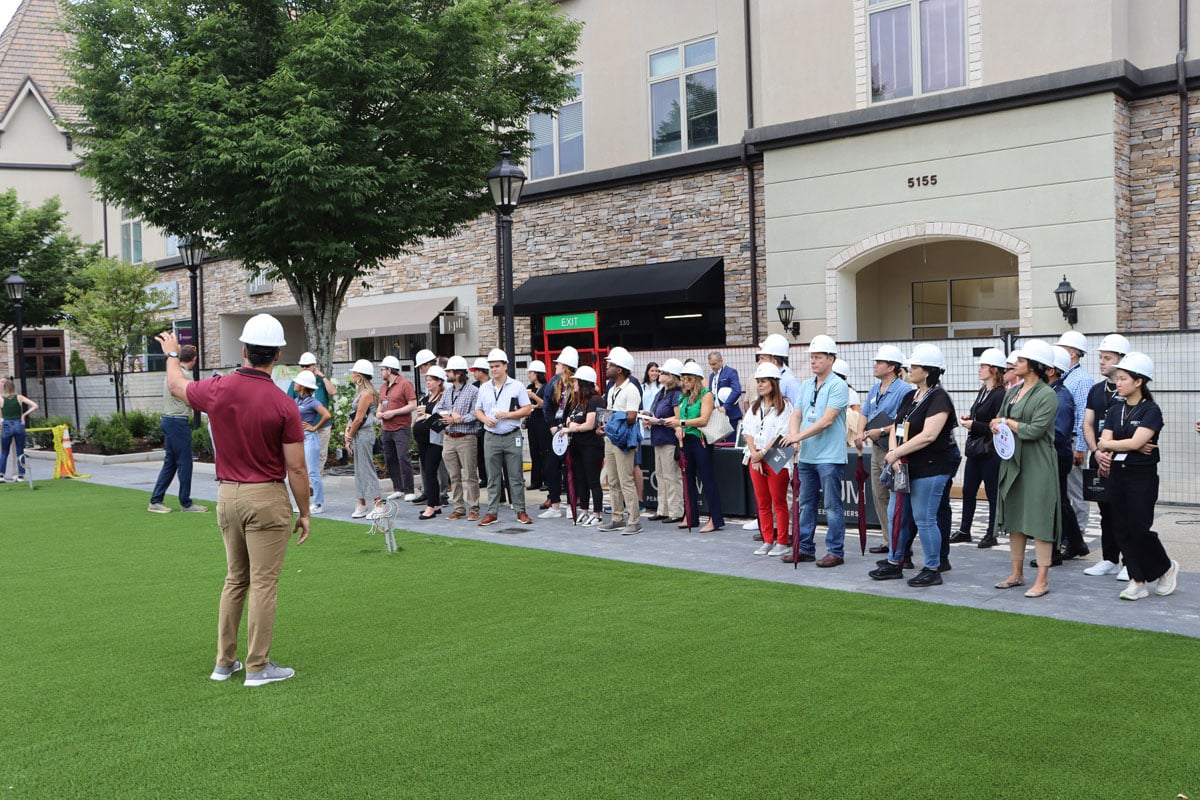
If you’ve been to or near the Forum in the past few months, you’ve probably noticed cranes and construction crews. The anticipation of the first phase of renovation of the 22-year-old retail center has left a lot of Peachtree Corners residents as well as nearby patrons excited to see changes.
The Forum administration invited the media for a hard hat tour on July 17. The event showcased the redevelopment progress ahead of The Plaza’s grand opening on Aug. 8.

Scrumptious bites incoming
Executives from the development and leasing teams joined on-site management and led attendees around the new central gathering space, guest amenities and Politan Row, the newly created 10,000-square-foot food hall.
Dining concepts from veterans at Sheesh, Twenty-Six Thai and newbie Gekko Kitchen were the first food vendors announced for the space, which is expected to open in January.
“We can’t wait to introduce the Peachtree Corners community to our food hall experience,” said Politan Group CEO Will Donaldson in a news release. “Every detail from the design to the bar program to the cuisine is thoughtfully curated to inspire guests to not only mingle with one another but to connect with our incredible restaurateurs and discover new favorites.”
During the tour, Donaldson explained that eventually there will be seven different global cuisines in the Politan Row food court at the Forum featuring well-known and up-and-coming local talent. Once complete there will be a central bar, a private event venue and a covered outdoor patio.
“One of the things that we’re excited about is this unique design that we’ve come up with, that’s very specific to this area,” he said. “We’ll be open seven days a week for lunch and dinner. Whether you’re with a group for lunch or with your family, it works great for multiple settings.”
Twenty-six Thai owner Niki Pattharakositkul said the restaurant will work with local vendors to source the freshest meats and produce possible.
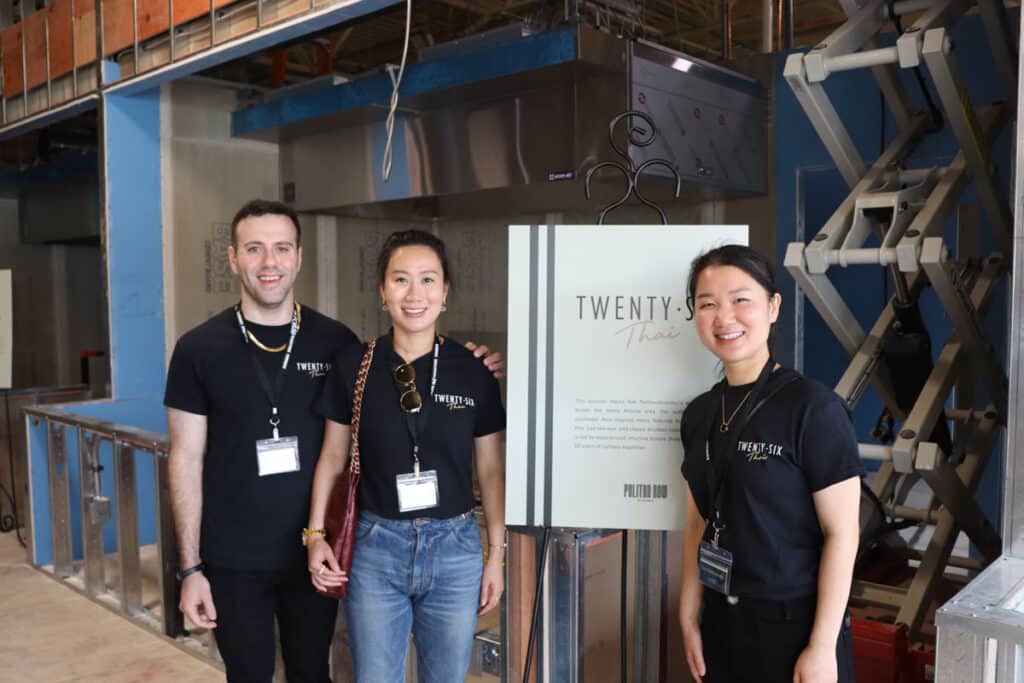
“There are certain types of produce and protein we try to source locally, but sauces and the more exotic produce and herbs, we have to import from Thailand,” she said. “Our brand is trying to move towards doing things locally and sustainably.”
Working with organizations such as Georgia Grown limits the use of large food distribution companies. Since starting Twenty-six Thai in 2016, Pattharakositkul has launched seven locations across metro Atlanta, including at Politan Row’s Ashford Lane and Colony Square.
The eatery describes itself as an “authentic wok-fired Southeast Asia-inspired menu featuring items such as pad Thai, pad see ewe and classic drunken noodles.”
Sheesh, a Mediterranean concept that uses simple, wholesome ingredients prepared with unique spices and blends, is run by corporate executive chef Charlie Sunyapong and director of operations Raquel Stalcup. The two are also members of the group behind full-service restaurants Stäge at Town Center and Pêche at the Forum.
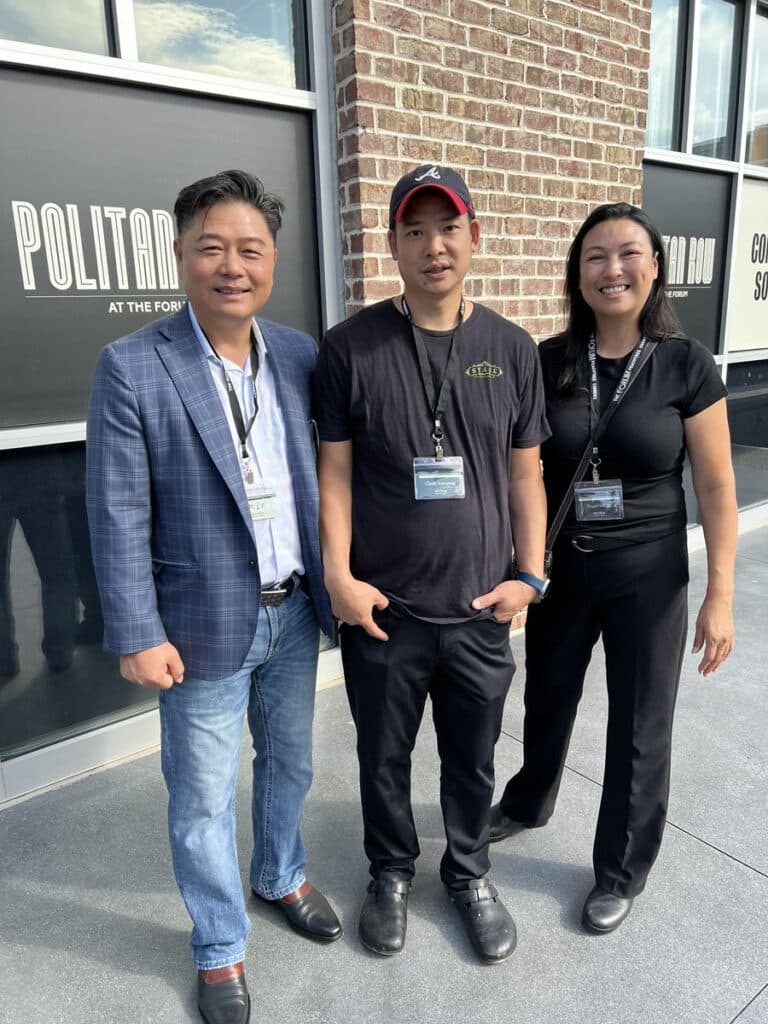
The popularity of those suburban concepts has already taken off. With Sheesh, they’re looking to do something different.
“There are going to be some things that are unique to Sheesh that you’re not going to get at the other places,” said Sunyapong. “You’re not getting a whole restaurant; this is quicker fare.”
Gekko Kitchen, a former food truck transformed into a hibachi and ramen experience, will be serving fresh, fast bowls that are more colorful and lighter than traditional hibachi fare.
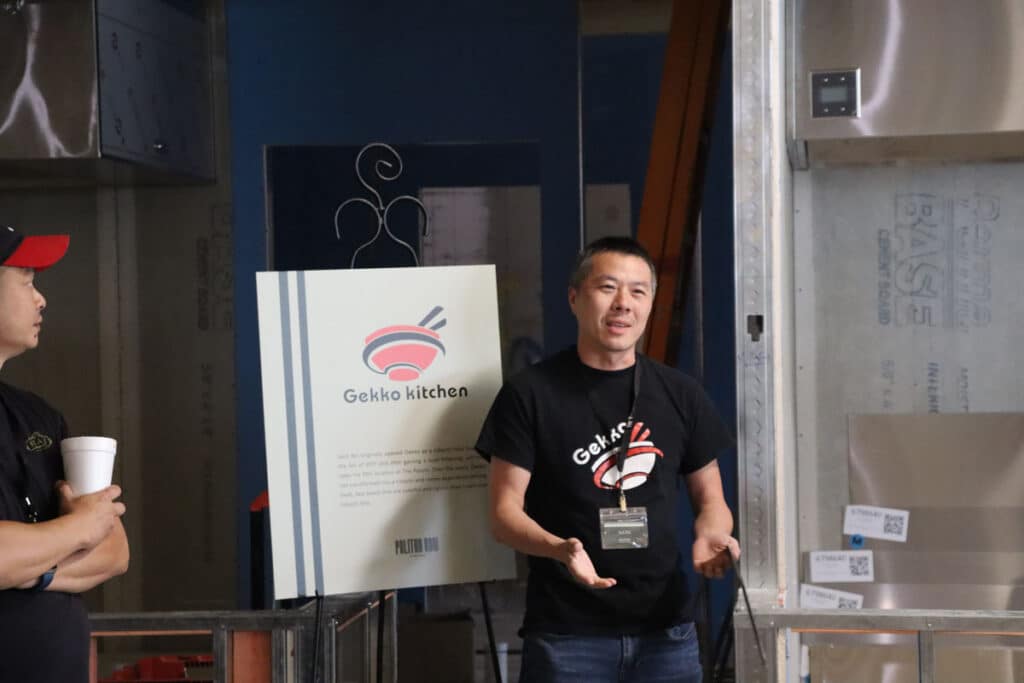
Gathering spots
Development Manager Nick Lombardo explained that NAP is moving away from building big construction projects from scratch like Colony Square in Midtown Atlanta and Avalon in Alpharetta.
“As a company, North American Properties pivoted around 2020 from building big ground-up construction to more redevelopment with already existing properties,” he said. “With the thought of great assets that just need a little more attention Infused into them to create value, we bought the Forum in 2022.”
He said that value-add propositions done at The Forum will create a more walkable center.
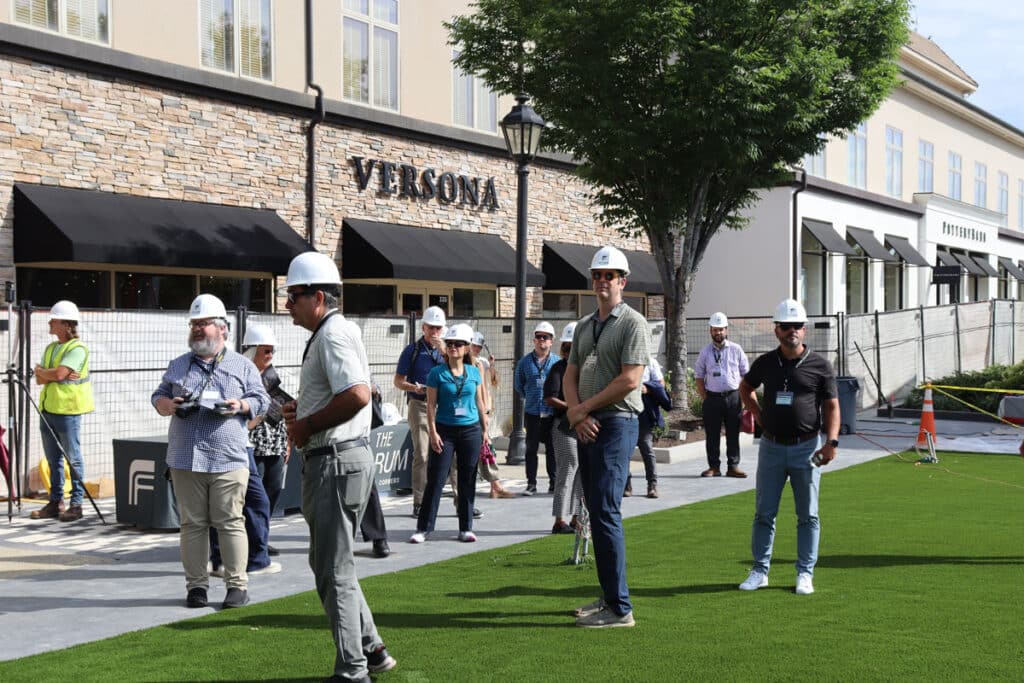
“Trying to compete with the internet on convenience is a very tough task, so the way we differentiate is by experiences,” he said. “We host between 150 to 200 events every year. We have things like concerts, wellness and fitness events and we have child playtime events. Our marketing team does a great job and they’re the differentiator when it comes to what makes our property stand out.”
By the first week of August, a large gathering space will be unveiled in the central area of the property between Pottery Barn and seafood restaurant Pêche. It will have a nine-foot LED screen capable of hosting movie nights and sports viewing. There will also be musical performances featuring local artists.
“We’re not in competition with Town Center,” said Charlotte Hinton, marketing manager at The Forum. “Town Center has gates like a real music festival and we’re more like a ‘chill and enjoy the music’ vibe where you can grab a beer and hang out or maybe kind of walk around.”
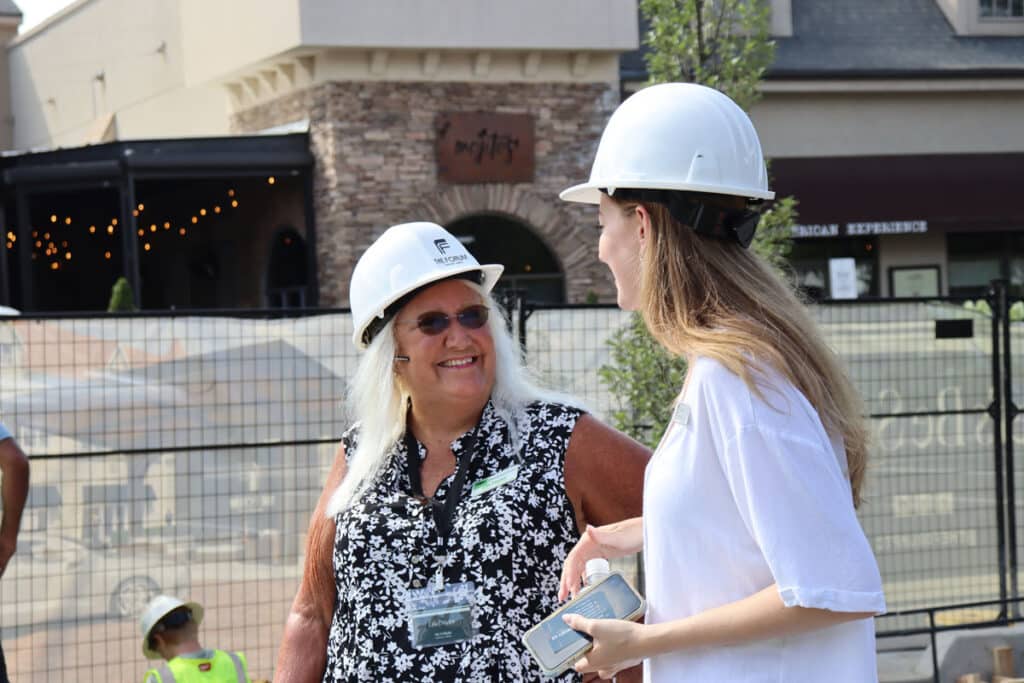
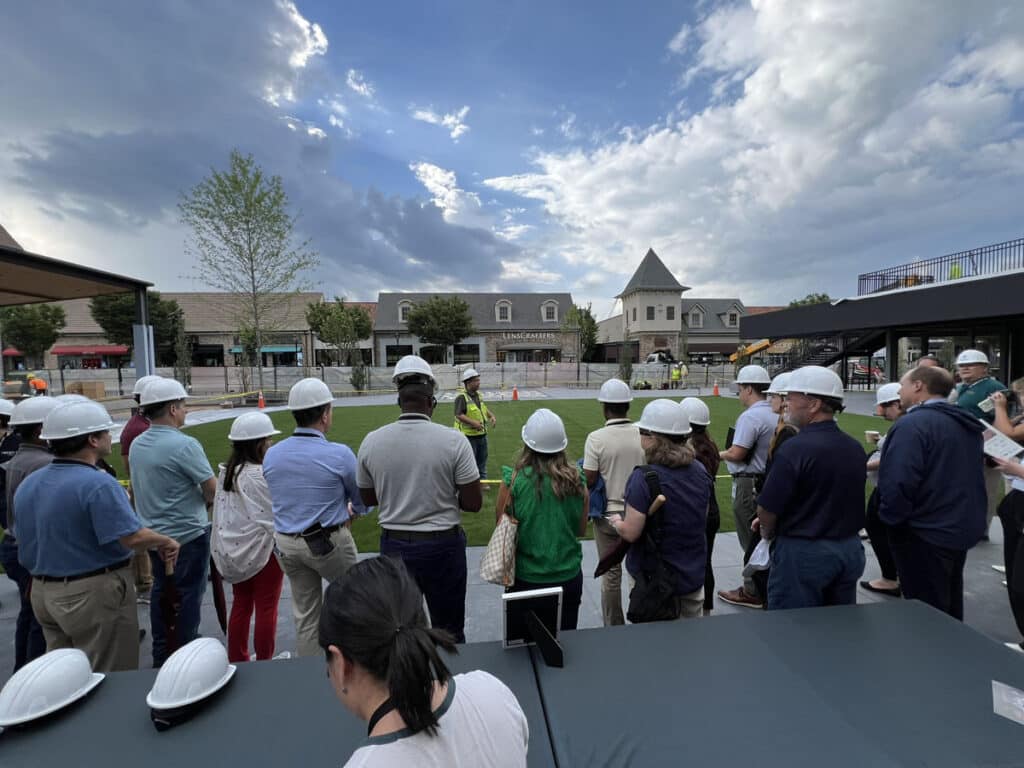
The smaller space and artificial turf are unlike the Town Center space where attendees spread blankets and bring chairs. The Forum will have furniture and seating in the space so folks can just gather and either enjoy time with family or partake in events.
The Forum will also offer valet parking on a limited schedule at that end of the property.
More improvements
Although the construction equipment will have moved out, the jewel box building will house a yet-to-be-named restaurant that will open early next year.
“We’re pretty much done with what we’re doing as far as landlord work,” said Lombardo. “We ask our tenants to bring their brand and their design and their material pallet and put that on the building to express their brand identity. They know their brand better than we do. They know how to best design their building and how it functions and works.”
It’s the same process with retail stores, he added.

“We always ask all of our new tenants to come in here when they’re building their storefront,” he said. “They’re not just selling their clothes; they’re selling a lifestyle in the brand so we ask them to push their brand out to the street.”
Even with the new spaces, there will be no shortage of parking, Lombardo added. “There’s plenty of parking behind these buildings,” he said pointing toward Pêche. “What we’ve done is enhance the connectivity to those areas. We’ve redone this breezeway and we’re adding lighting and connecting the parking lot to the main boulevard here. The goal is to replace cars with people and activity and bring a sense of community to the property.”
Related
Business
Taste of Peachtree Corners: PCBA Showcases Local Restaurants
Published
1 week agoon
July 17, 2024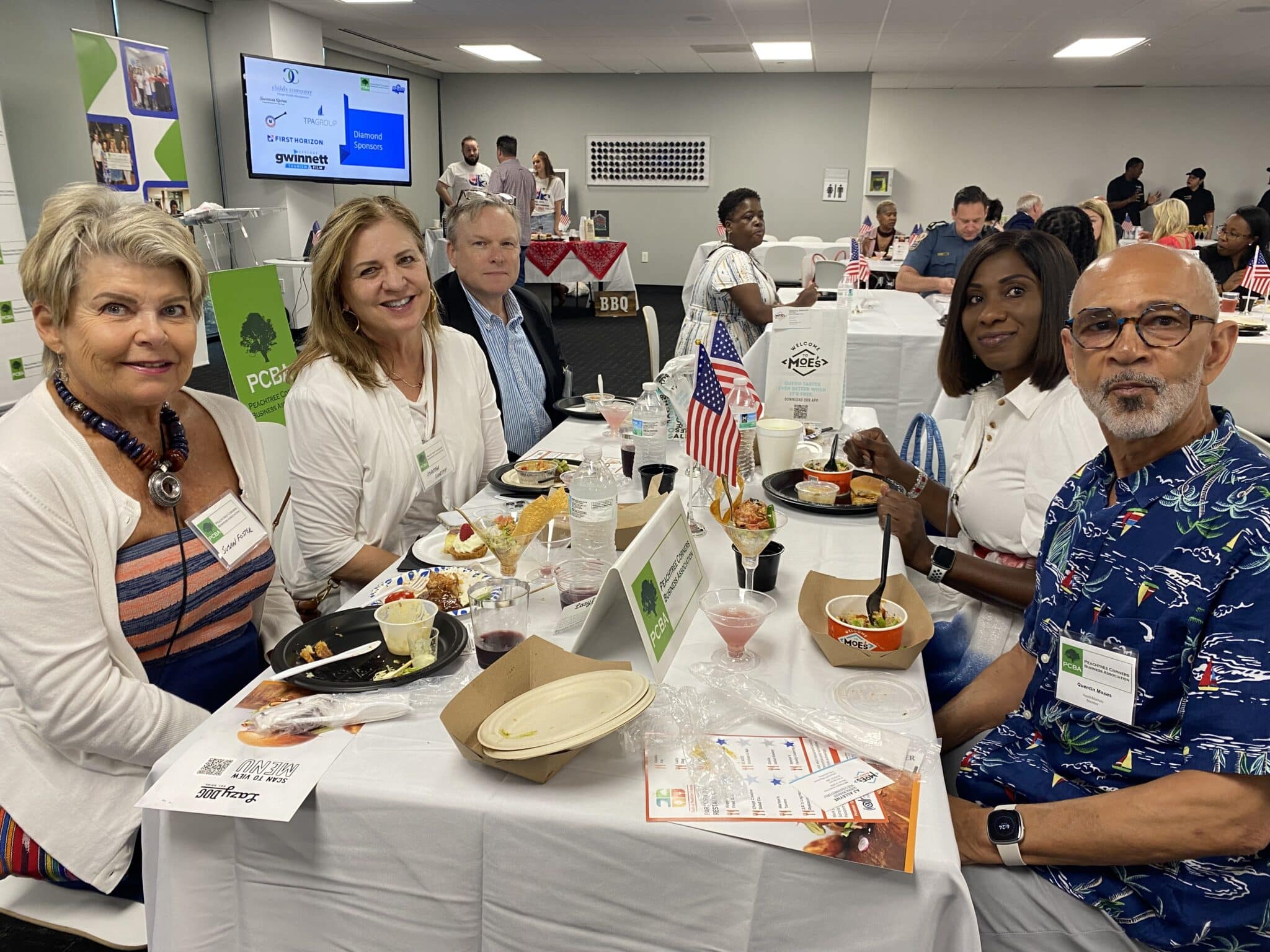
The Taste of Peachtree Corners has been in the works for years, but the COVID-19 pandemic put many key events on hold for the Peachtree Corners Business Association (PCBA).
But luckily this year, the dedicated staff of volunteers successfully executed a memorable event and introduced a lot of local business owners to their neighboring restaurants and caterers.
As I walked up to the Community Chest Room at Peachtree Corners City Hall on June 27, there was a line outside the door. I later found out that over 100 people had registered to attend the event. I got checked in quickly and was faced with a “passport” of 10 Peachtree Corners restaurants serving everything from high-end bakery items to good old-fashioned barbecue, and modern twists on seafood and American cuisines.
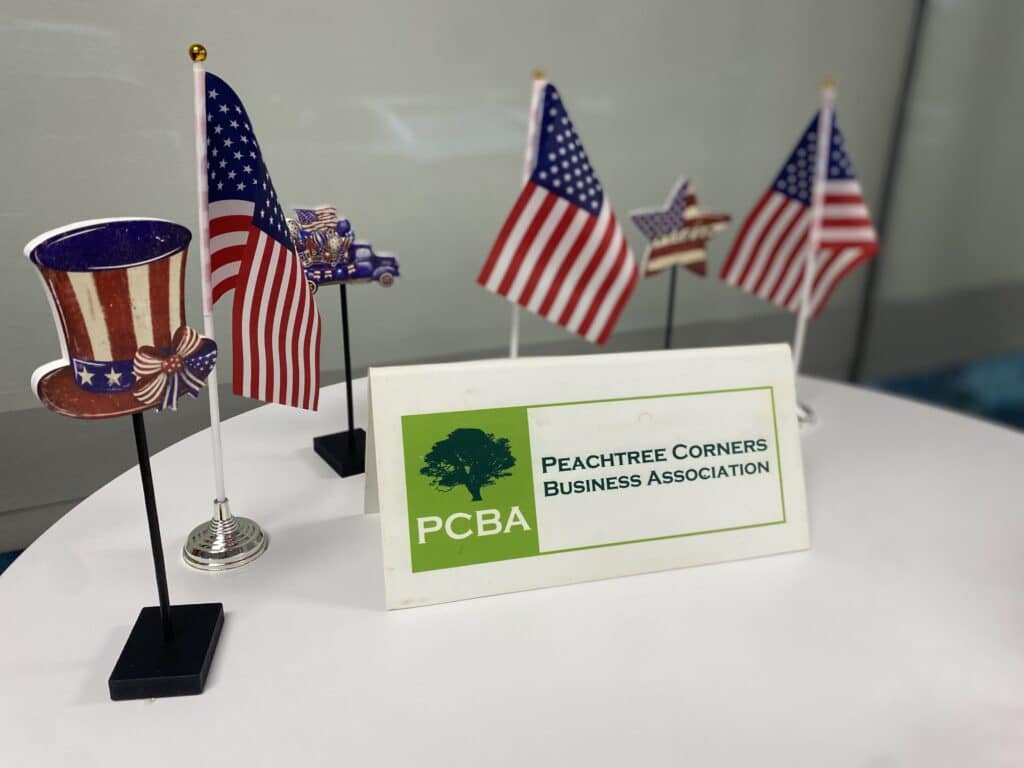
Let’s talk about the food
The idea was to visit all 10 restaurants and collect stars while trying samples and small plates. My first stop was Firebirds Wood Fired Grill, and they had my favorite – homemade chips and queso. The queso was smoky and mildly spicy with a great depth of flavor. What a great start. Next up was Chopt. Creative Salad Co. I had never heard of this restaurant before, but they blew me away with a perfect amuse-bouche of cherry tomato, pesto, mozzarella, and olive oil. These guys understand simple and fresh Mediterranean flavors.
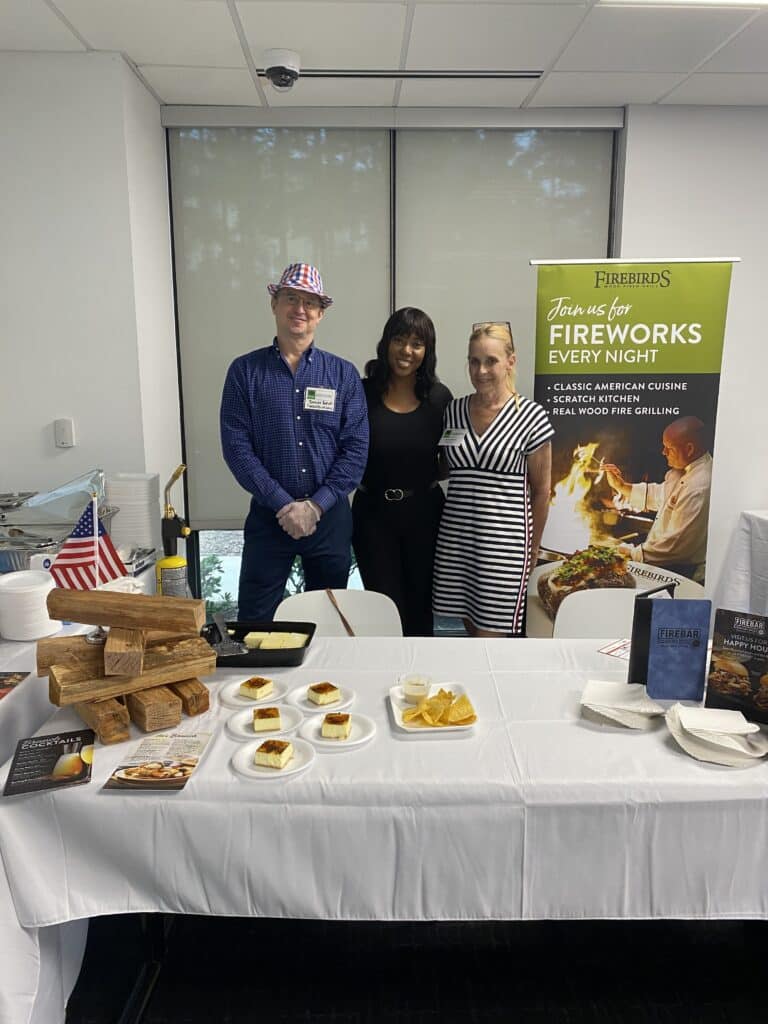
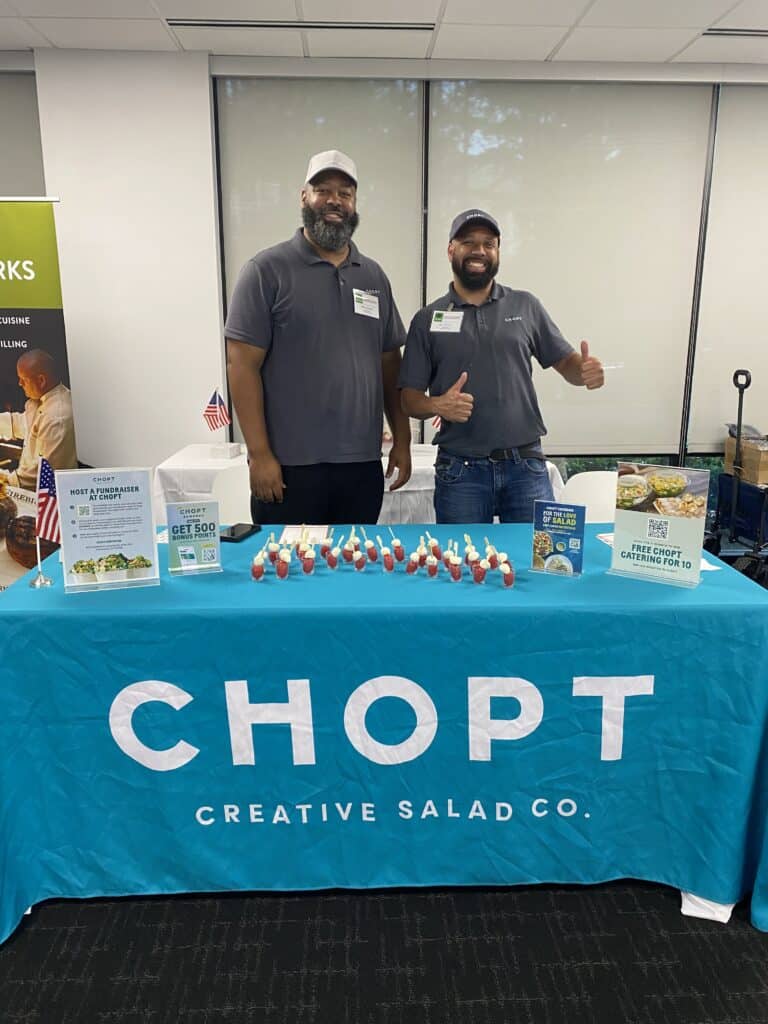

The folks from Marlow’s Tavern were also on-site serving shrimp and grits with jalapeno, spinach and tomato beurre blanc. This is definitely the style of elevated food I’ve come to expect from Marlow’s. And as a nice touch, they prepared a refreshing blueberry cocktail.
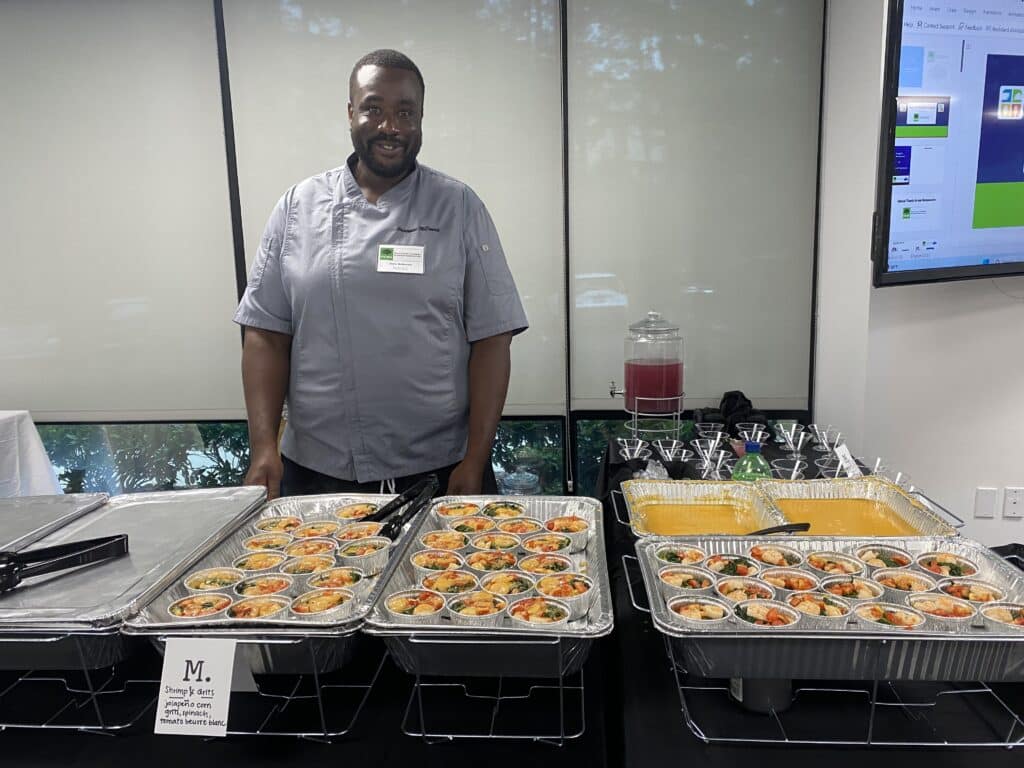

Another familiar face was set up on the other side of the room. J.R.’s Log House Restaurant served southern favorites like pulled pork sliders, baked beans and mac n’ cheese. I couldn’t pass this one up. The pulled pork was tender, tangy and saucy. Exactly what I want from a barbecue. Lazy Dog’s table really impressed me with its presentation. The tuna cup with rice, avocado and chili with chips on the side, was a real stunner.
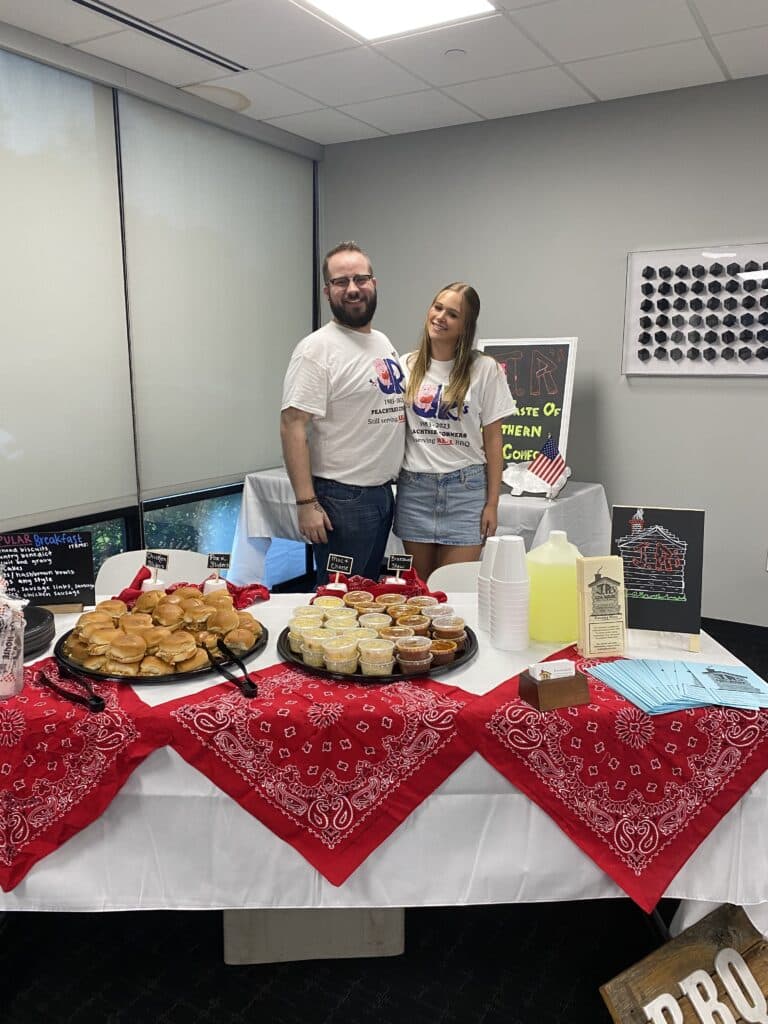
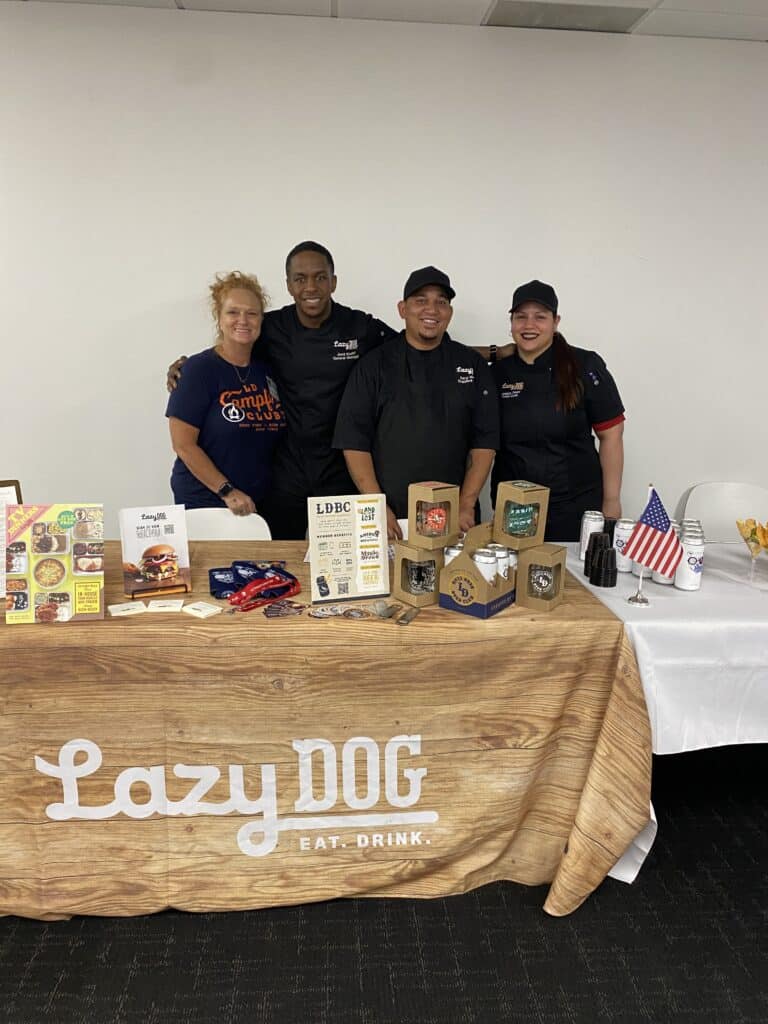
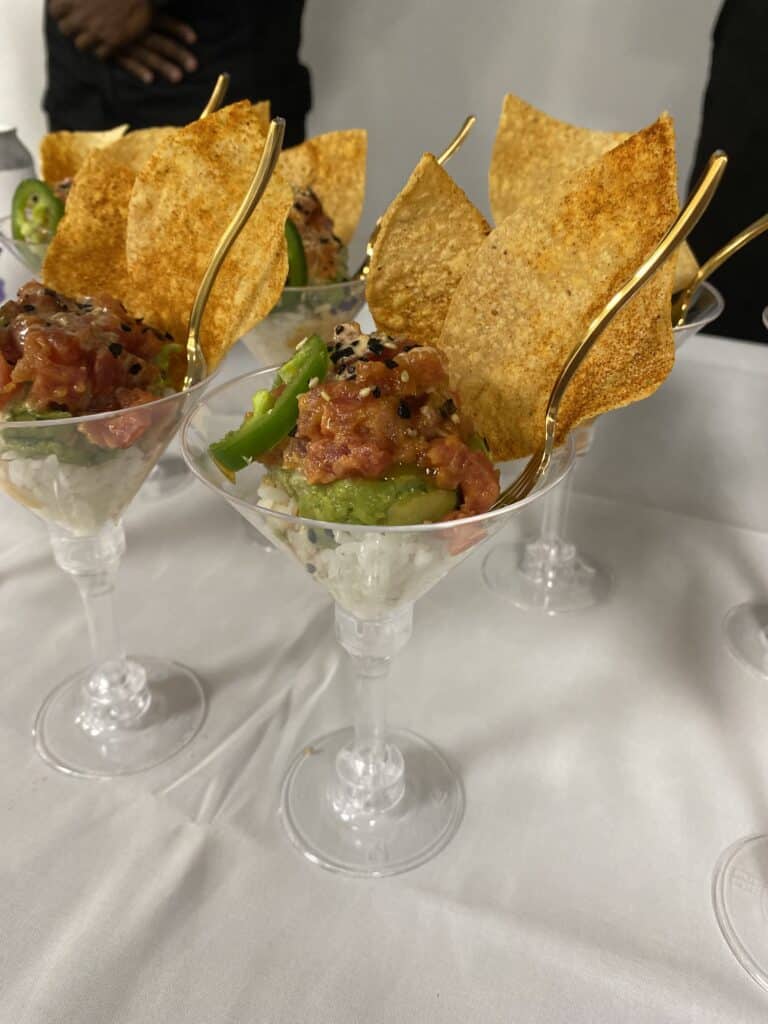
Moe’s Southwest Grill was also on-site handing out tasty tequila lime chicken with rice, avocado, and black beans. This super hearty and comforting entrée was followed by a seafood course from PECHE Modern Coastal. Crab cakes with a croissant pinwheel, roasted garlic and lemon aioli and arugula were on the menu and the flavor combinations were simply fantastic.
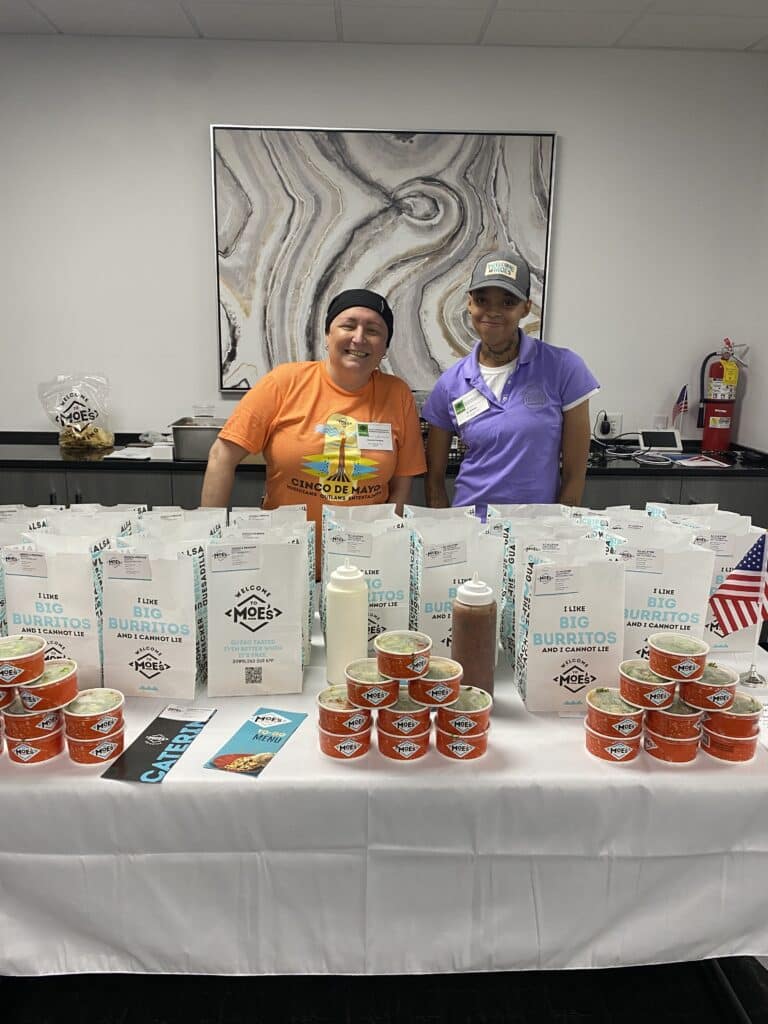
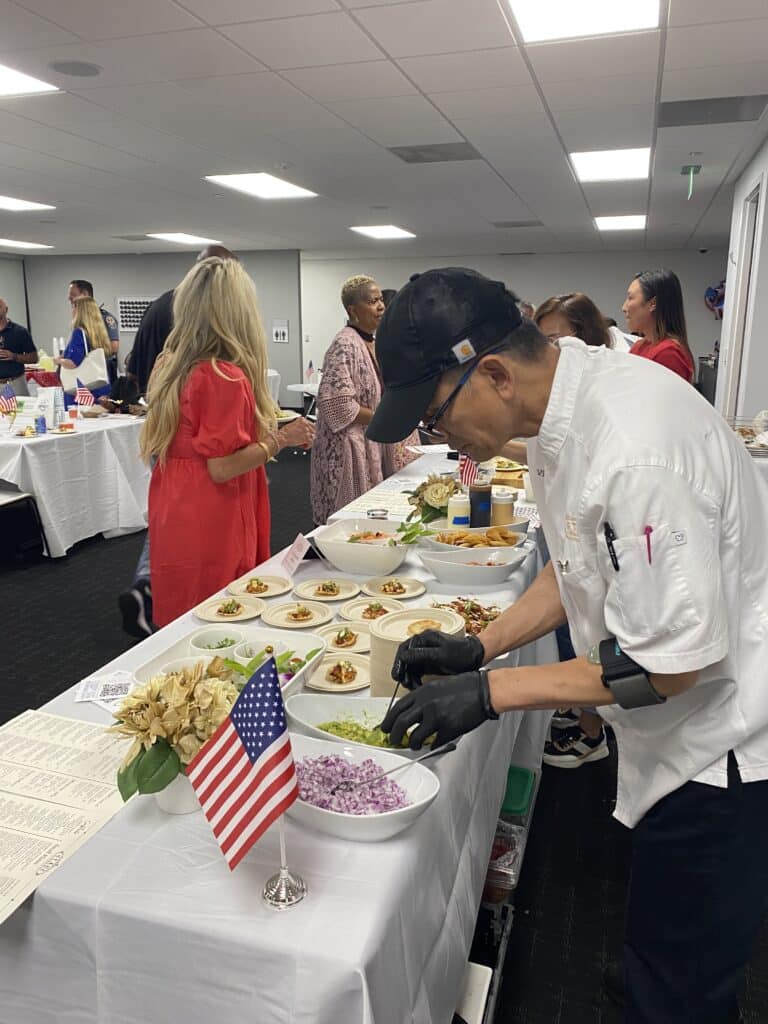
PECHE’s sister restaurant STAGE Kitchen & Bar was next door offering a tuna and salmon tostada with avocado, eel sauce, spicy mayo, and cilantro. This was easily one of my favorite bites of the night. The tostada was crunchy and light with clean and bright flavors. No kidding, I could probably eat this every day for lunch.
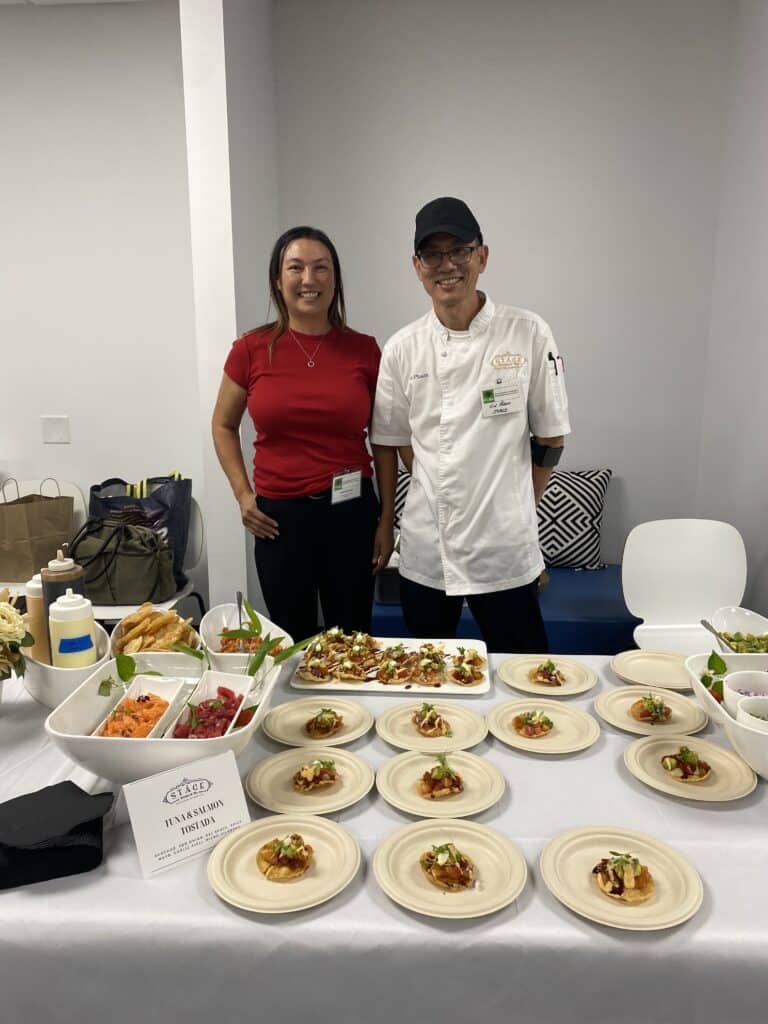

I moved on the Smoke’s Family Catering and owner Phillip Smoke had whipped up enough barbecue to feed an army. I had the pleasure of trying the smoked chicken with potato salad and it was the perfect pairing. Last but not least: dessert. I capped off the evening with a beautiful chocolate ganache-filled croissant with perfect lamination and flaky texture.
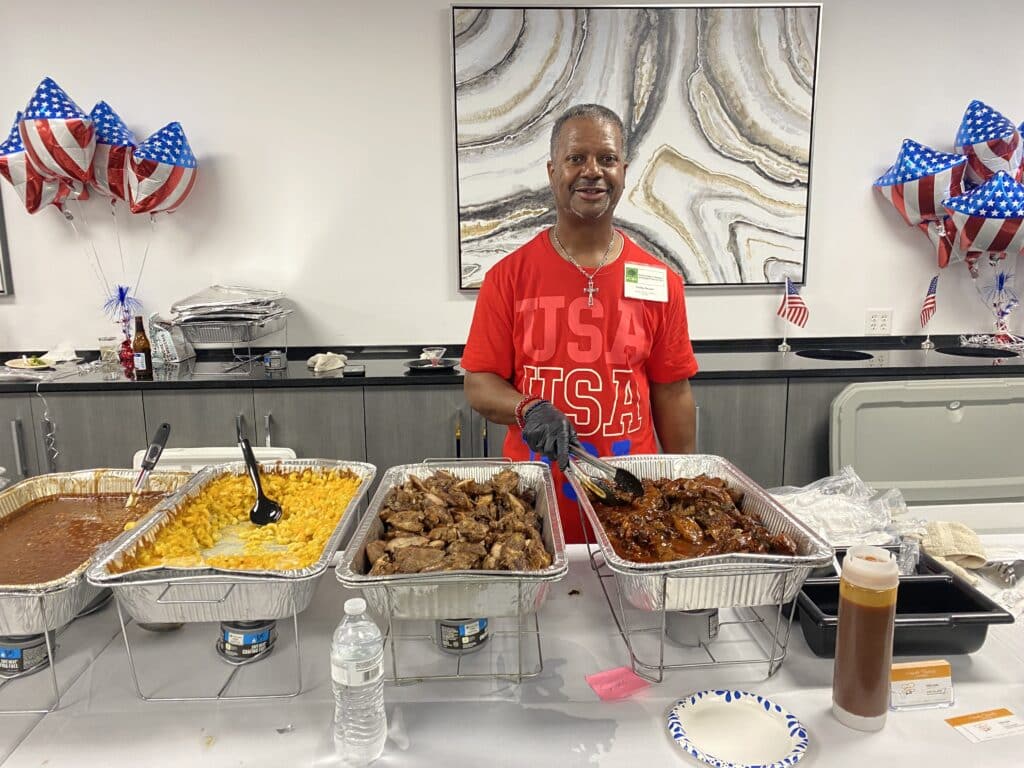
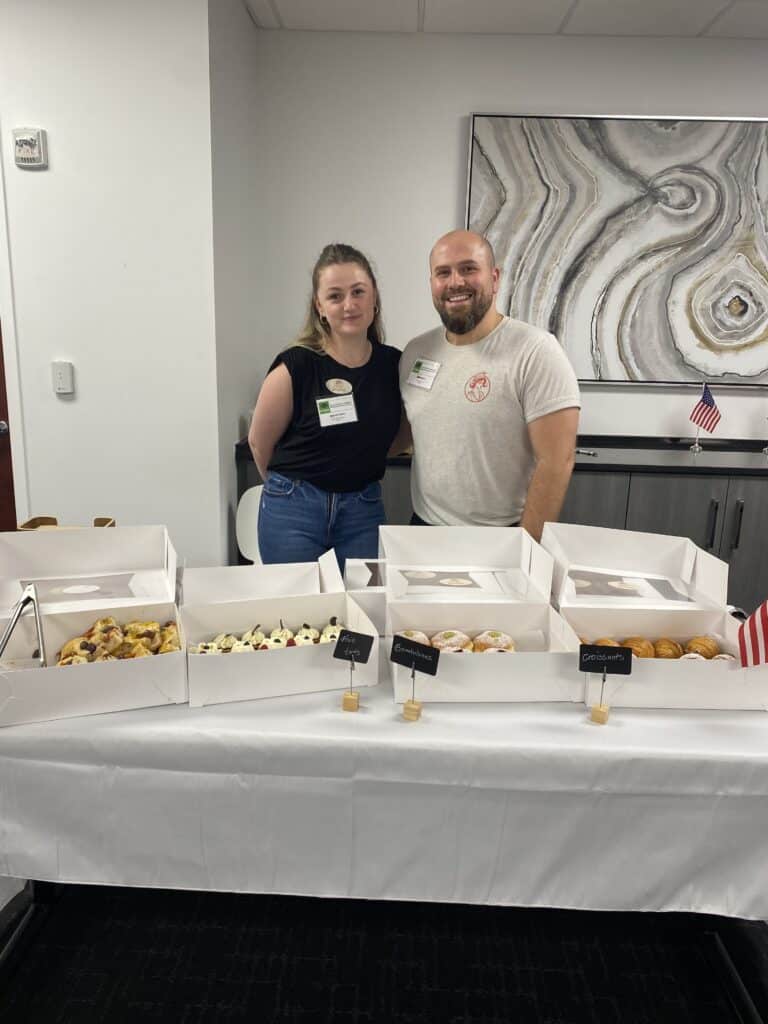

The inspiration behind the event
With a (very) full stomach, I caught up with PCBA President Lisa Proctor to talk about the event.
“We knew that COVID was really hard on a lot of our restaurants to get people back in,” said Proctor. “We wanted to do it in June because we wanted to celebrate our military. Everybody remembers them maybe on Memorial Day or different things, but June is the 80th anniversary of D-Day.”
“The military is always close to our heart,” she added. “We’re also very proud of our restaurants. They all have gone above and beyond.”
Tonight, the PCBA was honoring the Armed Forces and its brave veterans while bestowing two donation checks to very worthy causes.
The first check for $500 went to Folds of Honor. Since 2007, Folds of Honor has provided life-changing scholarships to the spouses and children of America’s fallen or disabled military. And now, their mission expands to the families of America’s first responders.
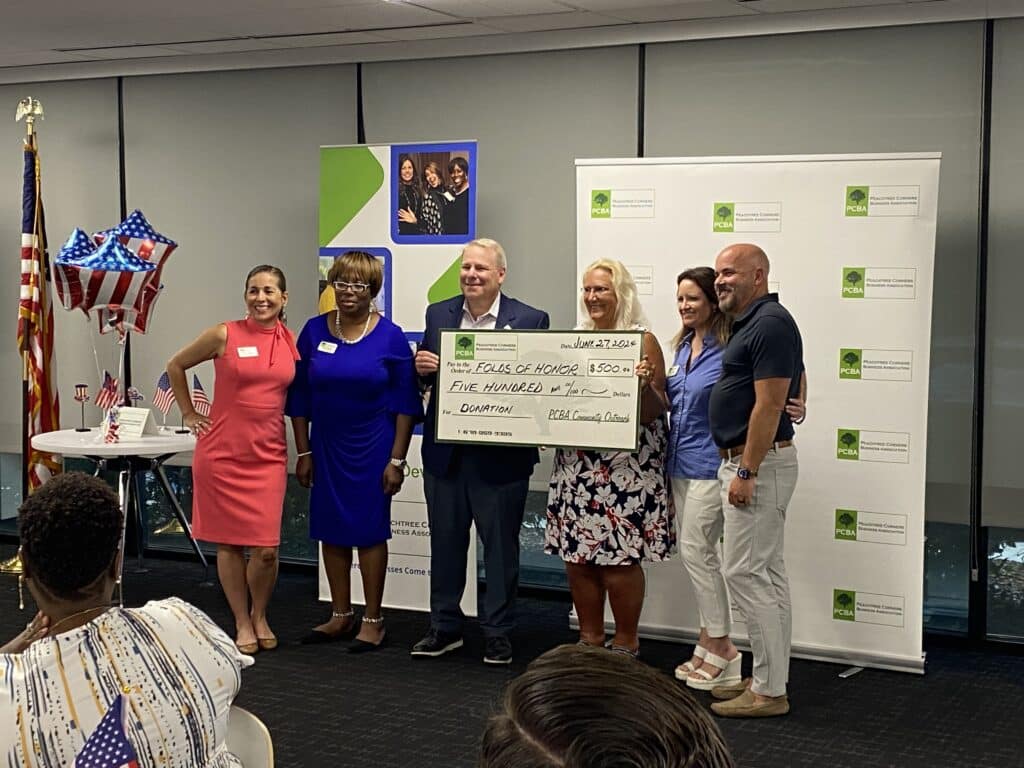
The second check for $500 was given to Light Up the Corners, a 501(c)(3) volunteer organization with an annual glowing, flashing, blinking, shining, nighttime running party and fundraiser in one. All proceeds from the event go to benefit less fortunate children and families in the Peachtree Corners community who are struggling by giving them the chance to participate in life-enhancing programs and activities at the Fowler YMCA.

Over the past 12 years, the PCBA has awarded 19 scholarships and donated more than $156,000+ back to the Peachtree Corners community.
Related
Business
Local Resident Opens AtWork Location in Peachtree Corners
Published
2 weeks agoon
July 10, 2024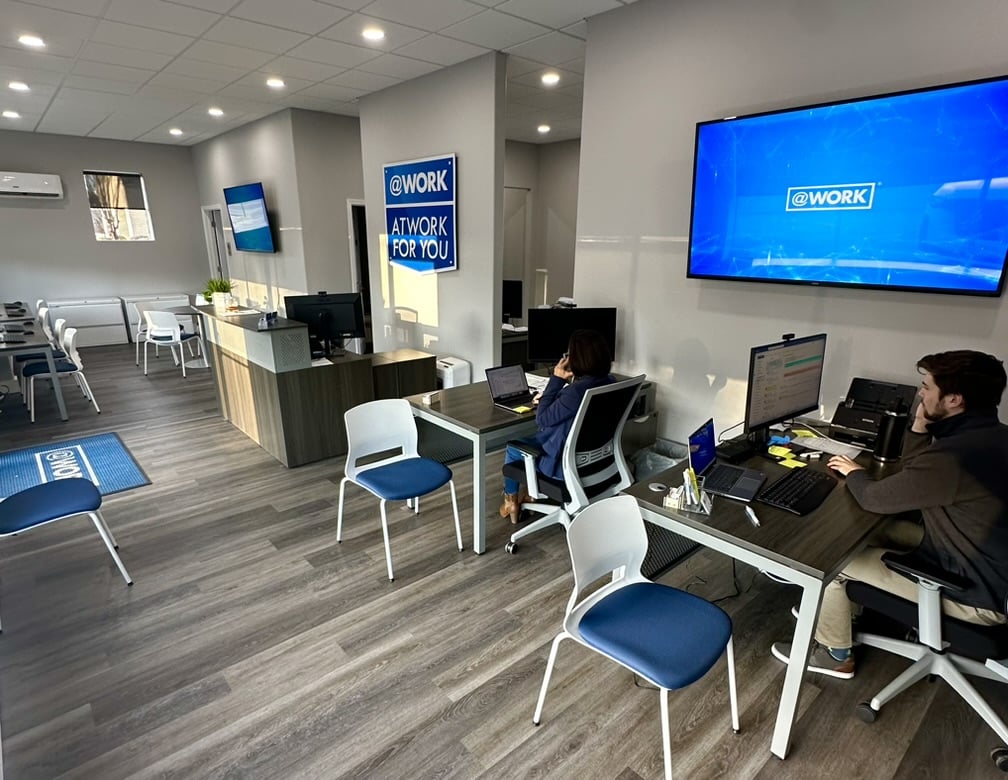
AtWork, one of nation’s leading staffing franchises, has opened its third Metro Atlanta location in Peachtree Corners, Georgia at 6185 Buford Highway, Suite E-100.
AtWork Peachtree Corners is locally-owned by Kamal Bhatia, an immigrant from India with decades of experience in hospitality and as the Senior Vice President of Operations of Atlanta-based Action Bartending School.
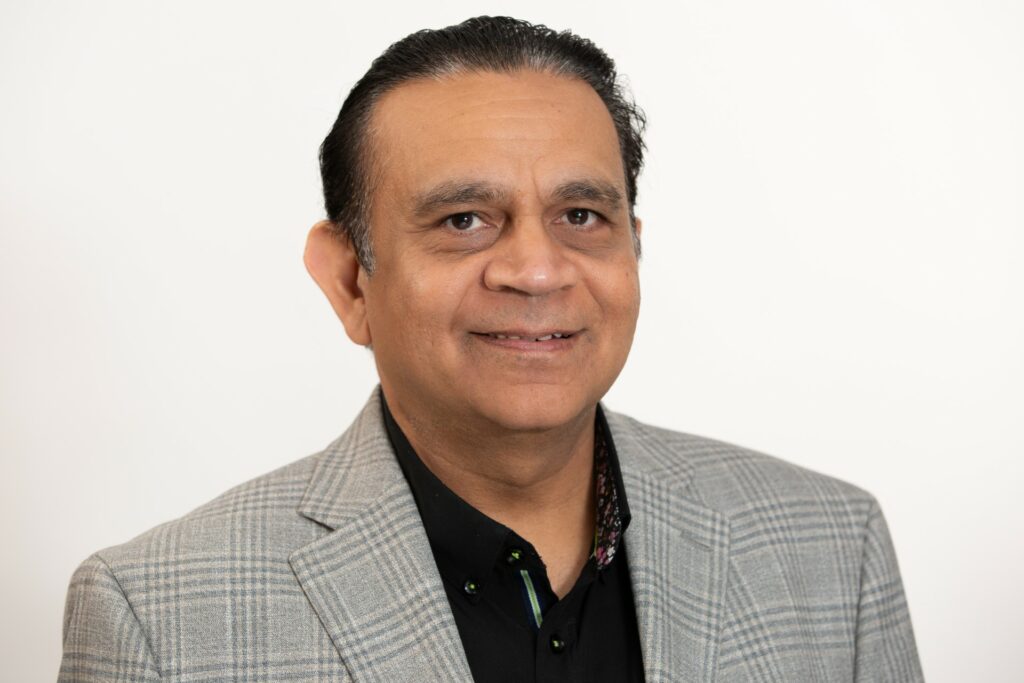
“There is an incredible need for AtWork’s services in Peachtree Corners,” said Bhatia. “Since migrating here in 1996, I’ve witnessed Atlanta evolve and sprout new communities north of the city, including my own. Peachtree Corners has become a hub for thriving businesses, and my goal with this location is to be a key resource between companies and job seekers to support the continued growth of our local economy.”
Bhatia’s son and daughter will assist him in the business.
“This is an opportunity to create a legacy company to ensure our community is supported for generations to come,” he said.
For more than three decades, AtWork’s mission has been to connect people with jobs and jobs with people. With more than 100 locations nationwide, AtWork puts nearly 40,000 individuals to work each year in administrative, light-industrial, accounting and finance, hospitality, IT and management-level positions at some of the nation’s largest and most recognizable companies.
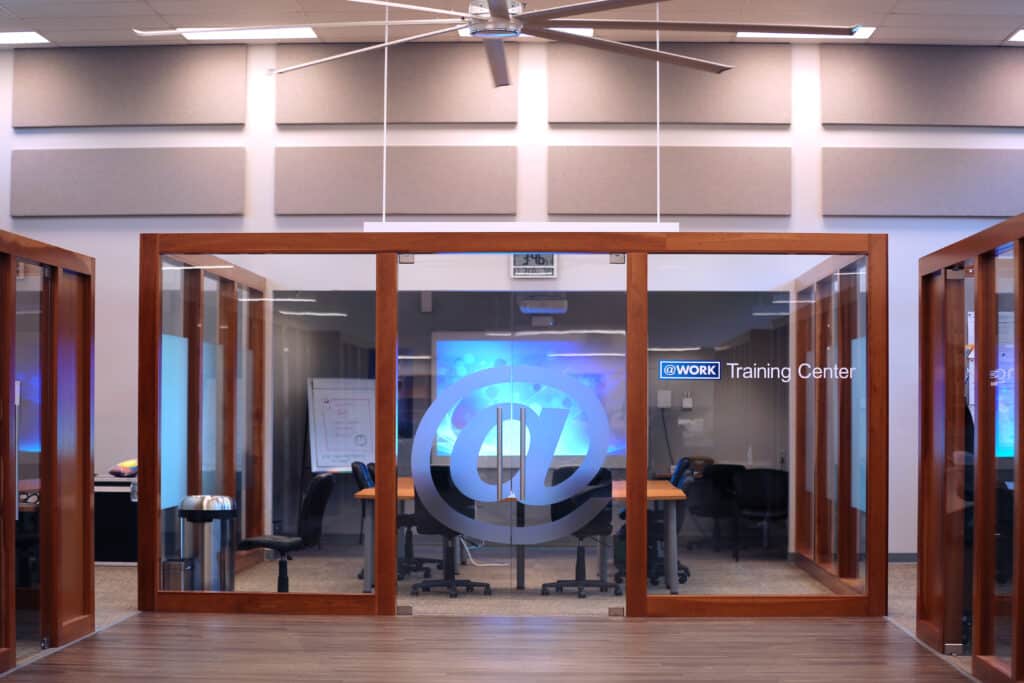
“We’re proud to open our doors in Peachtree Corners and provide a common place for both job seekers and growing businesses to turn for staffing solutions,” said Jason Leverant, President and COO of AtWork.
“AtWork will serve as a key resource to help employees thrive, businesses prosper and communities flourish. Kamal is the perfect partner to champion our mission and be a servant leader in her local community,” he added.
Related
Read the Digital Edition
Subscribe
Keep Up With Peachtree Corners News
Join our mailing list to receive the latest news and updates from our team.
You have Successfully Subscribed!

What’s going on at Jones Bridge Park and the Challenges of Urban Development

Taste of Peachtree Corners: PCBA Showcases Local Restaurants

The Forum Gives Sneak Peek of New Eateries and Community Spaces

Southwest Gwinnett Mayors Share Visions for the Future

8 Events Happening In and Around Peachtree Corners This August

Peachtree Corners Shines Bright with Light Up the Corners Glow Race this August

Peachtree Corners Shines Bright with Light Up the Corners Glow Race this August

The Forum Gives Sneak Peek of New Eateries and Community Spaces

8 Events Happening In and Around Peachtree Corners This August

Southwest Gwinnett Mayors Share Visions for the Future

Taste of Peachtree Corners: PCBA Showcases Local Restaurants

What’s going on at Jones Bridge Park and the Challenges of Urban Development

Local Resident Opens AtWork Location in Peachtree Corners

CHRIS 180 Expands its Services into Gwinnett County [Podcast]

Light up the Corners [Video]

Capitalist Sage: Business Leadership in Your Community [Podcast]

Cliff Bramble: A Culinary Adventure through Italy

Top 10 Brunch Places in Gwinnett County

A Hunger for Hospitality

THE CORNERS EPISODE 3 – BLAXICAN PART 1

Top 10 Indoor Things To Do This Winter

The ED Hour: What it takes to Remove Barriers from Education
Peachtree Corners Life
Topics and Categories
Trending
-
Business1 week ago
Taste of Peachtree Corners: PCBA Showcases Local Restaurants
-
Business2 days ago
The Forum Gives Sneak Peek of New Eateries and Community Spaces
-
City Government4 days ago
Southwest Gwinnett Mayors Share Visions for the Future
-
Around Atlanta4 days ago
8 Events Happening In and Around Peachtree Corners This August







